The Travel and Tourism Sector at TUI Group
VerifiedAdded on 2024/05/13
|32
|4001
|152
AI Summary
Explore the historical developments, structure, factors affecting tourism sector, impacts on TUI Group, and strategies to minimize negative impacts and maximize positive impacts. Understand the role of government and international bodies in the tourism industry.
Contribute Materials
Your contribution can guide someone’s learning journey. Share your
documents today.
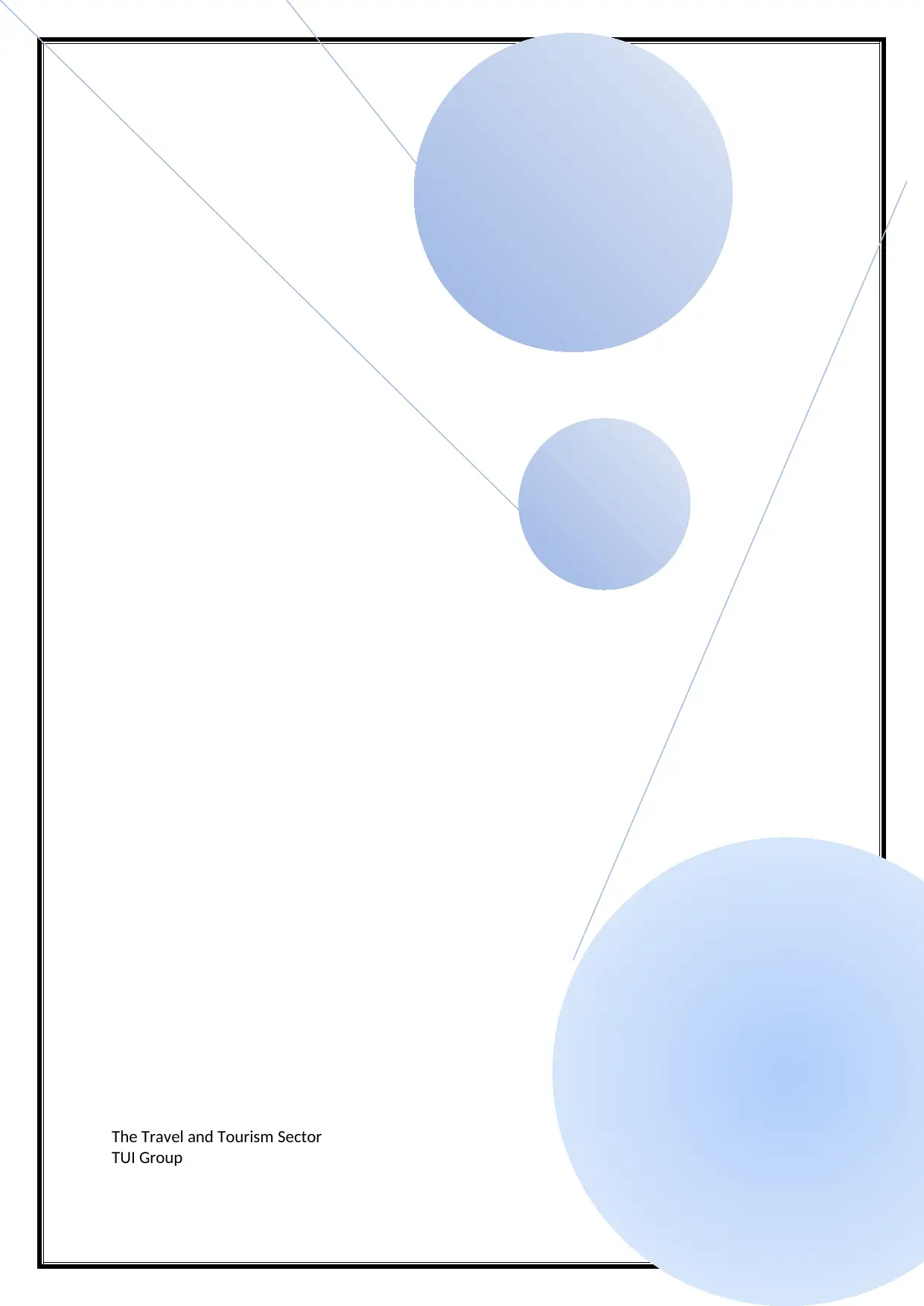
The Travel and Tourism Sector
TUI Group
TUI Group
Secure Best Marks with AI Grader
Need help grading? Try our AI Grader for instant feedback on your assignments.
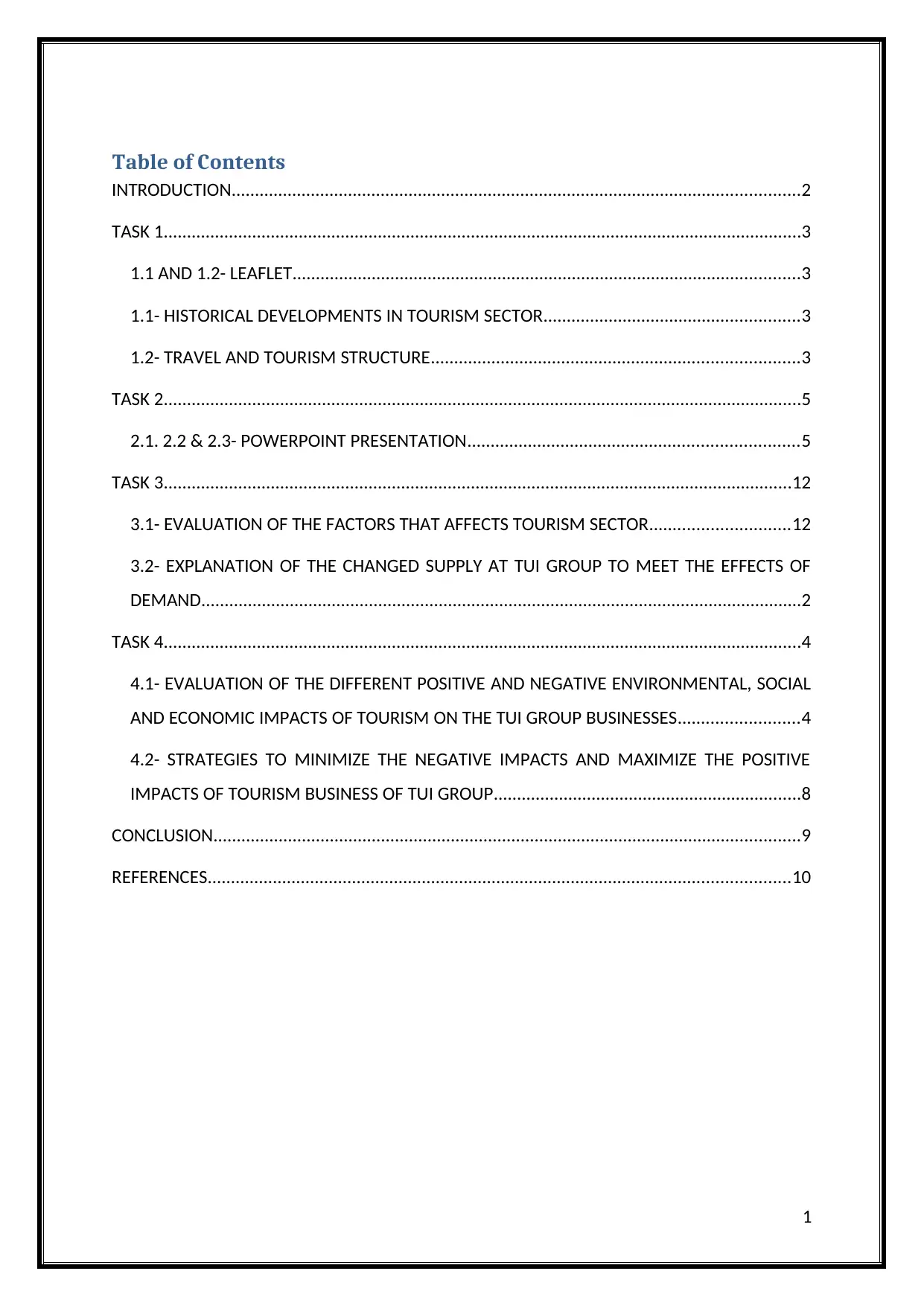
Table of Contents
INTRODUCTION..........................................................................................................................2
TASK 1.........................................................................................................................................3
1.1 AND 1.2- LEAFLET.............................................................................................................3
1.1- HISTORICAL DEVELOPMENTS IN TOURISM SECTOR.......................................................3
1.2- TRAVEL AND TOURISM STRUCTURE...............................................................................3
TASK 2.........................................................................................................................................5
2.1. 2.2 & 2.3- POWERPOINT PRESENTATION.......................................................................5
TASK 3.......................................................................................................................................12
3.1- EVALUATION OF THE FACTORS THAT AFFECTS TOURISM SECTOR..............................12
3.2- EXPLANATION OF THE CHANGED SUPPLY AT TUI GROUP TO MEET THE EFFECTS OF
DEMAND.................................................................................................................................2
TASK 4.........................................................................................................................................4
4.1- EVALUATION OF THE DIFFERENT POSITIVE AND NEGATIVE ENVIRONMENTAL, SOCIAL
AND ECONOMIC IMPACTS OF TOURISM ON THE TUI GROUP BUSINESSES..........................4
4.2- STRATEGIES TO MINIMIZE THE NEGATIVE IMPACTS AND MAXIMIZE THE POSITIVE
IMPACTS OF TOURISM BUSINESS OF TUI GROUP..................................................................8
CONCLUSION..............................................................................................................................9
REFERENCES.............................................................................................................................10
1
INTRODUCTION..........................................................................................................................2
TASK 1.........................................................................................................................................3
1.1 AND 1.2- LEAFLET.............................................................................................................3
1.1- HISTORICAL DEVELOPMENTS IN TOURISM SECTOR.......................................................3
1.2- TRAVEL AND TOURISM STRUCTURE...............................................................................3
TASK 2.........................................................................................................................................5
2.1. 2.2 & 2.3- POWERPOINT PRESENTATION.......................................................................5
TASK 3.......................................................................................................................................12
3.1- EVALUATION OF THE FACTORS THAT AFFECTS TOURISM SECTOR..............................12
3.2- EXPLANATION OF THE CHANGED SUPPLY AT TUI GROUP TO MEET THE EFFECTS OF
DEMAND.................................................................................................................................2
TASK 4.........................................................................................................................................4
4.1- EVALUATION OF THE DIFFERENT POSITIVE AND NEGATIVE ENVIRONMENTAL, SOCIAL
AND ECONOMIC IMPACTS OF TOURISM ON THE TUI GROUP BUSINESSES..........................4
4.2- STRATEGIES TO MINIMIZE THE NEGATIVE IMPACTS AND MAXIMIZE THE POSITIVE
IMPACTS OF TOURISM BUSINESS OF TUI GROUP..................................................................8
CONCLUSION..............................................................................................................................9
REFERENCES.............................................................................................................................10
1
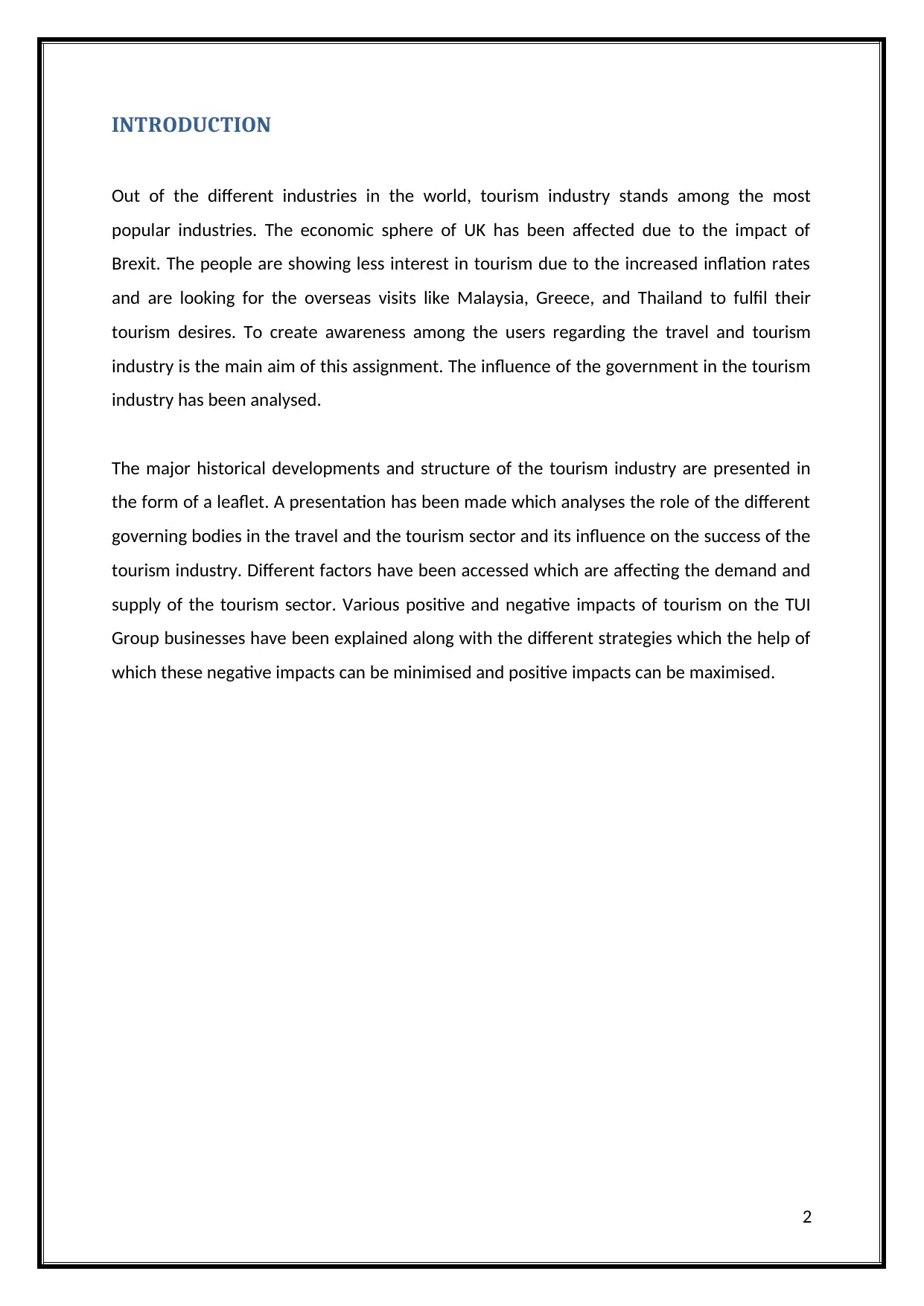
INTRODUCTION
Out of the different industries in the world, tourism industry stands among the most
popular industries. The economic sphere of UK has been affected due to the impact of
Brexit. The people are showing less interest in tourism due to the increased inflation rates
and are looking for the overseas visits like Malaysia, Greece, and Thailand to fulfil their
tourism desires. To create awareness among the users regarding the travel and tourism
industry is the main aim of this assignment. The influence of the government in the tourism
industry has been analysed.
The major historical developments and structure of the tourism industry are presented in
the form of a leaflet. A presentation has been made which analyses the role of the different
governing bodies in the travel and the tourism sector and its influence on the success of the
tourism industry. Different factors have been accessed which are affecting the demand and
supply of the tourism sector. Various positive and negative impacts of tourism on the TUI
Group businesses have been explained along with the different strategies which the help of
which these negative impacts can be minimised and positive impacts can be maximised.
2
Out of the different industries in the world, tourism industry stands among the most
popular industries. The economic sphere of UK has been affected due to the impact of
Brexit. The people are showing less interest in tourism due to the increased inflation rates
and are looking for the overseas visits like Malaysia, Greece, and Thailand to fulfil their
tourism desires. To create awareness among the users regarding the travel and tourism
industry is the main aim of this assignment. The influence of the government in the tourism
industry has been analysed.
The major historical developments and structure of the tourism industry are presented in
the form of a leaflet. A presentation has been made which analyses the role of the different
governing bodies in the travel and the tourism sector and its influence on the success of the
tourism industry. Different factors have been accessed which are affecting the demand and
supply of the tourism sector. Various positive and negative impacts of tourism on the TUI
Group businesses have been explained along with the different strategies which the help of
which these negative impacts can be minimised and positive impacts can be maximised.
2
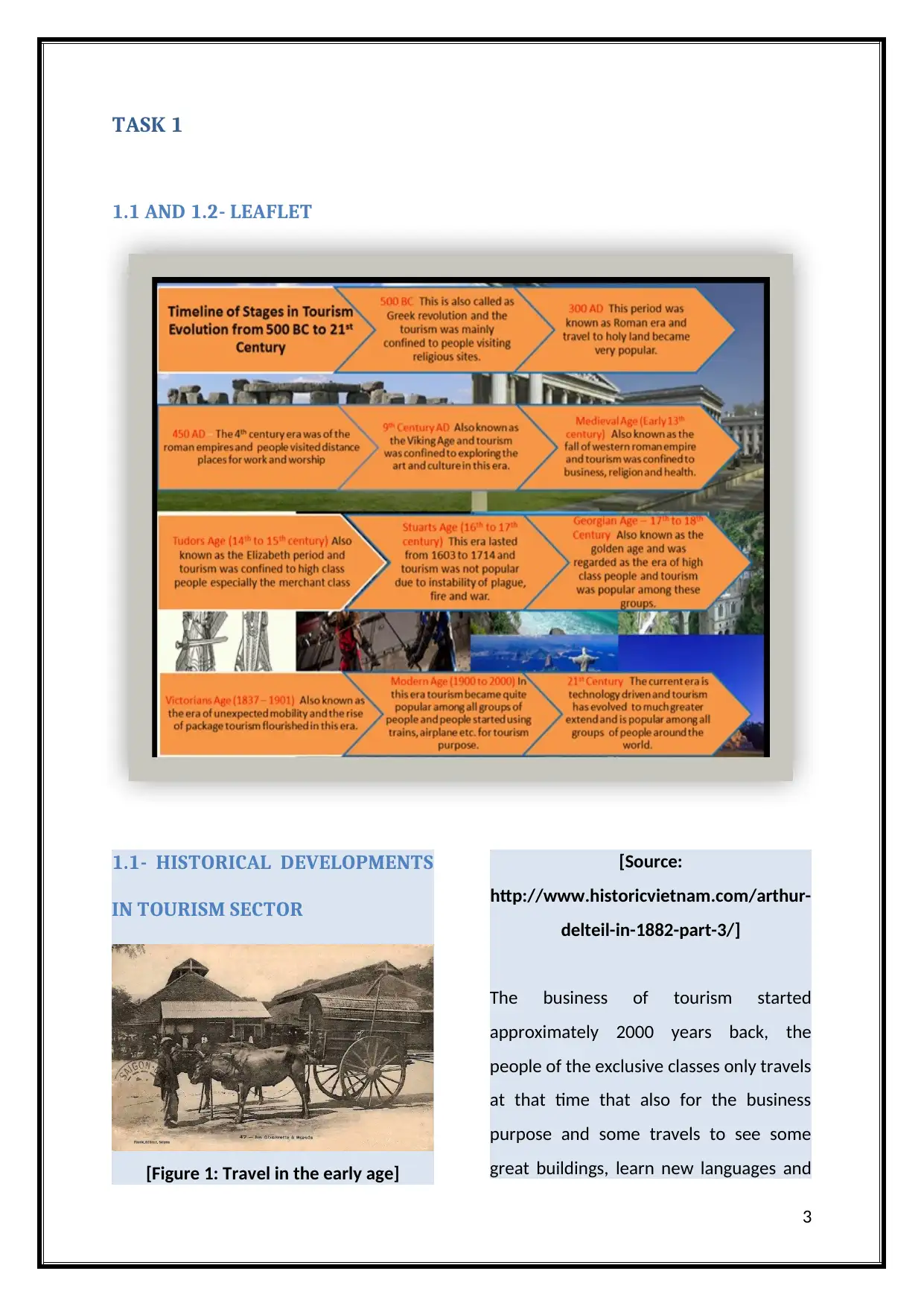
TASK 1
1.1 AND 1.2- LEAFLET
1.1- HISTORICAL DEVELOPMENTS
IN TOURISM SECTOR
[Figure 1: Travel in the early age]
[Source:
http://www.historicvietnam.com/arthur-
delteil-in-1882-part-3/]
The business of tourism started
approximately 2000 years back, the
people of the exclusive classes only travels
at that time that also for the business
purpose and some travels to see some
great buildings, learn new languages and
3
1.1 AND 1.2- LEAFLET
1.1- HISTORICAL DEVELOPMENTS
IN TOURISM SECTOR
[Figure 1: Travel in the early age]
[Source:
http://www.historicvietnam.com/arthur-
delteil-in-1882-part-3/]
The business of tourism started
approximately 2000 years back, the
people of the exclusive classes only travels
at that time that also for the business
purpose and some travels to see some
great buildings, learn new languages and
3
Secure Best Marks with AI Grader
Need help grading? Try our AI Grader for instant feedback on your assignments.
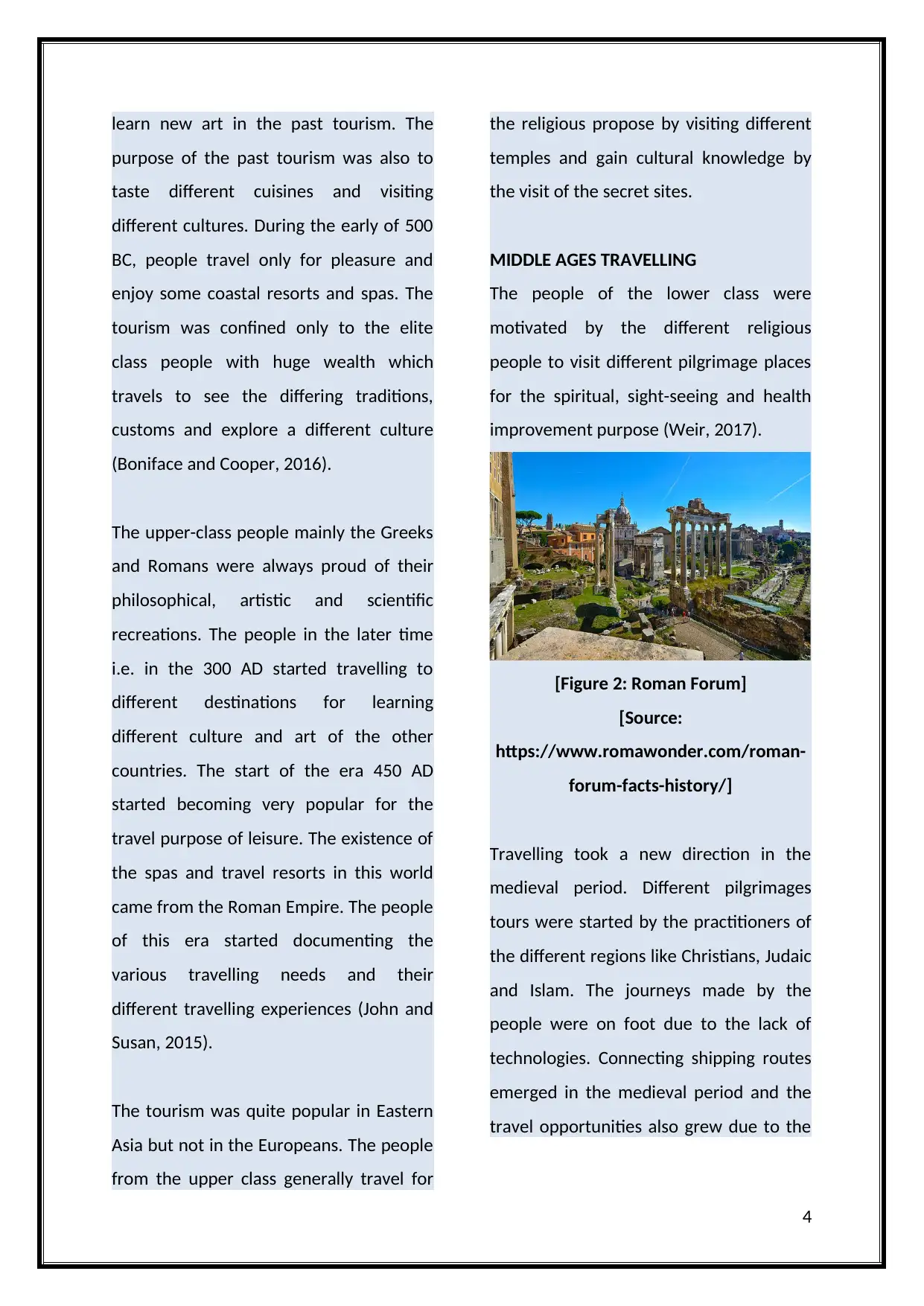
learn new art in the past tourism. The
purpose of the past tourism was also to
taste different cuisines and visiting
different cultures. During the early of 500
BC, people travel only for pleasure and
enjoy some coastal resorts and spas. The
tourism was confined only to the elite
class people with huge wealth which
travels to see the differing traditions,
customs and explore a different culture
(Boniface and Cooper, 2016).
The upper-class people mainly the Greeks
and Romans were always proud of their
philosophical, artistic and scientific
recreations. The people in the later time
i.e. in the 300 AD started travelling to
different destinations for learning
different culture and art of the other
countries. The start of the era 450 AD
started becoming very popular for the
travel purpose of leisure. The existence of
the spas and travel resorts in this world
came from the Roman Empire. The people
of this era started documenting the
various travelling needs and their
different travelling experiences (John and
Susan, 2015).
The tourism was quite popular in Eastern
Asia but not in the Europeans. The people
from the upper class generally travel for
the religious propose by visiting different
temples and gain cultural knowledge by
the visit of the secret sites.
MIDDLE AGES TRAVELLING
The people of the lower class were
motivated by the different religious
people to visit different pilgrimage places
for the spiritual, sight-seeing and health
improvement purpose (Weir, 2017).
[Figure 2: Roman Forum]
[Source:
https://www.romawonder.com/roman-
forum-facts-history/]
Travelling took a new direction in the
medieval period. Different pilgrimages
tours were started by the practitioners of
the different regions like Christians, Judaic
and Islam. The journeys made by the
people were on foot due to the lack of
technologies. Connecting shipping routes
emerged in the medieval period and the
travel opportunities also grew due to the
4
purpose of the past tourism was also to
taste different cuisines and visiting
different cultures. During the early of 500
BC, people travel only for pleasure and
enjoy some coastal resorts and spas. The
tourism was confined only to the elite
class people with huge wealth which
travels to see the differing traditions,
customs and explore a different culture
(Boniface and Cooper, 2016).
The upper-class people mainly the Greeks
and Romans were always proud of their
philosophical, artistic and scientific
recreations. The people in the later time
i.e. in the 300 AD started travelling to
different destinations for learning
different culture and art of the other
countries. The start of the era 450 AD
started becoming very popular for the
travel purpose of leisure. The existence of
the spas and travel resorts in this world
came from the Roman Empire. The people
of this era started documenting the
various travelling needs and their
different travelling experiences (John and
Susan, 2015).
The tourism was quite popular in Eastern
Asia but not in the Europeans. The people
from the upper class generally travel for
the religious propose by visiting different
temples and gain cultural knowledge by
the visit of the secret sites.
MIDDLE AGES TRAVELLING
The people of the lower class were
motivated by the different religious
people to visit different pilgrimage places
for the spiritual, sight-seeing and health
improvement purpose (Weir, 2017).
[Figure 2: Roman Forum]
[Source:
https://www.romawonder.com/roman-
forum-facts-history/]
Travelling took a new direction in the
medieval period. Different pilgrimages
tours were started by the practitioners of
the different regions like Christians, Judaic
and Islam. The journeys made by the
people were on foot due to the lack of
technologies. Connecting shipping routes
emerged in the medieval period and the
travel opportunities also grew due to the
4
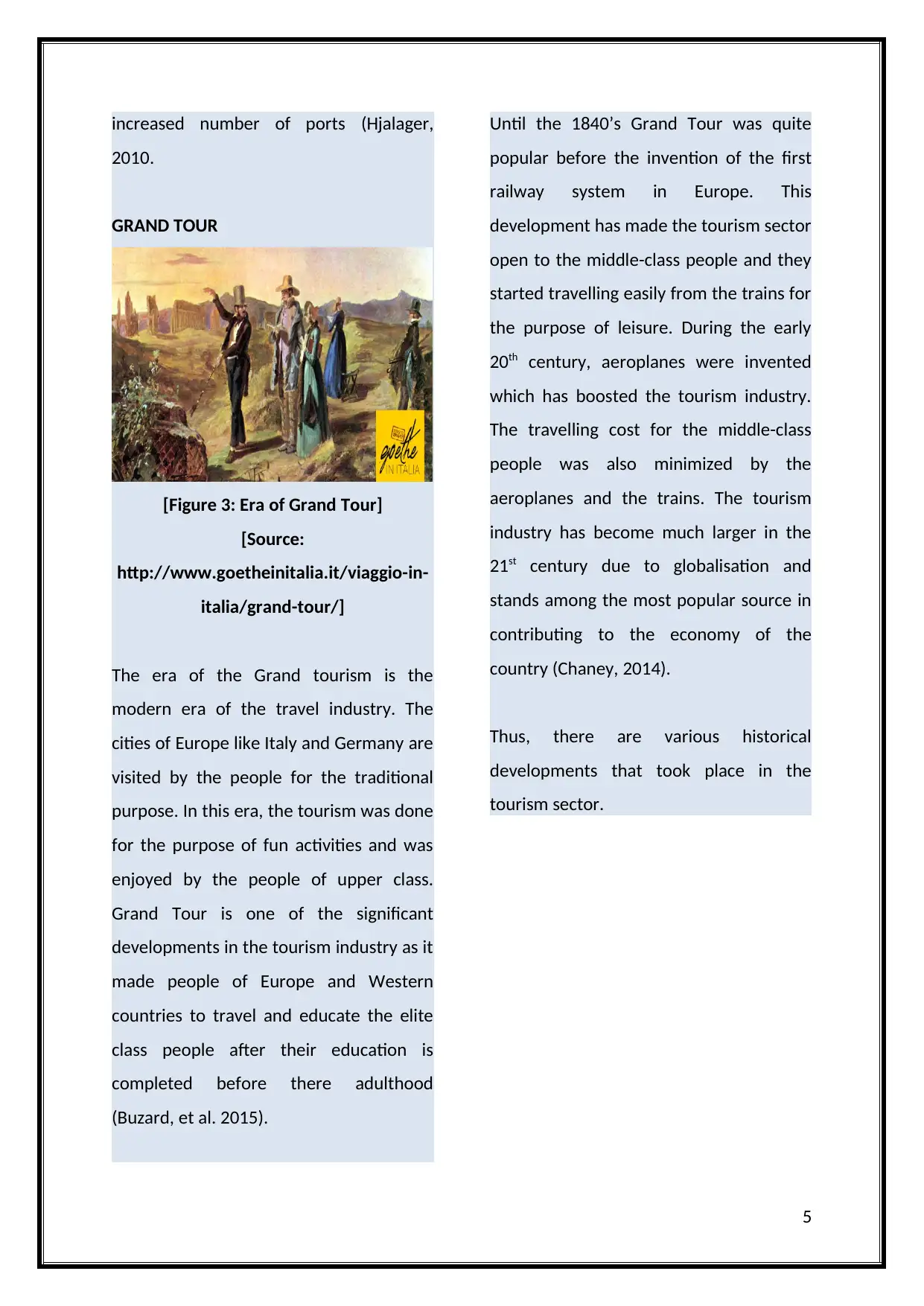
increased number of ports (Hjalager,
2010.
GRAND TOUR
[Figure 3: Era of Grand Tour]
[Source:
http://www.goetheinitalia.it/viaggio-in-
italia/grand-tour/]
The era of the Grand tourism is the
modern era of the travel industry. The
cities of Europe like Italy and Germany are
visited by the people for the traditional
purpose. In this era, the tourism was done
for the purpose of fun activities and was
enjoyed by the people of upper class.
Grand Tour is one of the significant
developments in the tourism industry as it
made people of Europe and Western
countries to travel and educate the elite
class people after their education is
completed before there adulthood
(Buzard, et al. 2015).
Until the 1840’s Grand Tour was quite
popular before the invention of the first
railway system in Europe. This
development has made the tourism sector
open to the middle-class people and they
started travelling easily from the trains for
the purpose of leisure. During the early
20th century, aeroplanes were invented
which has boosted the tourism industry.
The travelling cost for the middle-class
people was also minimized by the
aeroplanes and the trains. The tourism
industry has become much larger in the
21st century due to globalisation and
stands among the most popular source in
contributing to the economy of the
country (Chaney, 2014).
Thus, there are various historical
developments that took place in the
tourism sector.
5
2010.
GRAND TOUR
[Figure 3: Era of Grand Tour]
[Source:
http://www.goetheinitalia.it/viaggio-in-
italia/grand-tour/]
The era of the Grand tourism is the
modern era of the travel industry. The
cities of Europe like Italy and Germany are
visited by the people for the traditional
purpose. In this era, the tourism was done
for the purpose of fun activities and was
enjoyed by the people of upper class.
Grand Tour is one of the significant
developments in the tourism industry as it
made people of Europe and Western
countries to travel and educate the elite
class people after their education is
completed before there adulthood
(Buzard, et al. 2015).
Until the 1840’s Grand Tour was quite
popular before the invention of the first
railway system in Europe. This
development has made the tourism sector
open to the middle-class people and they
started travelling easily from the trains for
the purpose of leisure. During the early
20th century, aeroplanes were invented
which has boosted the tourism industry.
The travelling cost for the middle-class
people was also minimized by the
aeroplanes and the trains. The tourism
industry has become much larger in the
21st century due to globalisation and
stands among the most popular source in
contributing to the economy of the
country (Chaney, 2014).
Thus, there are various historical
developments that took place in the
tourism sector.
5
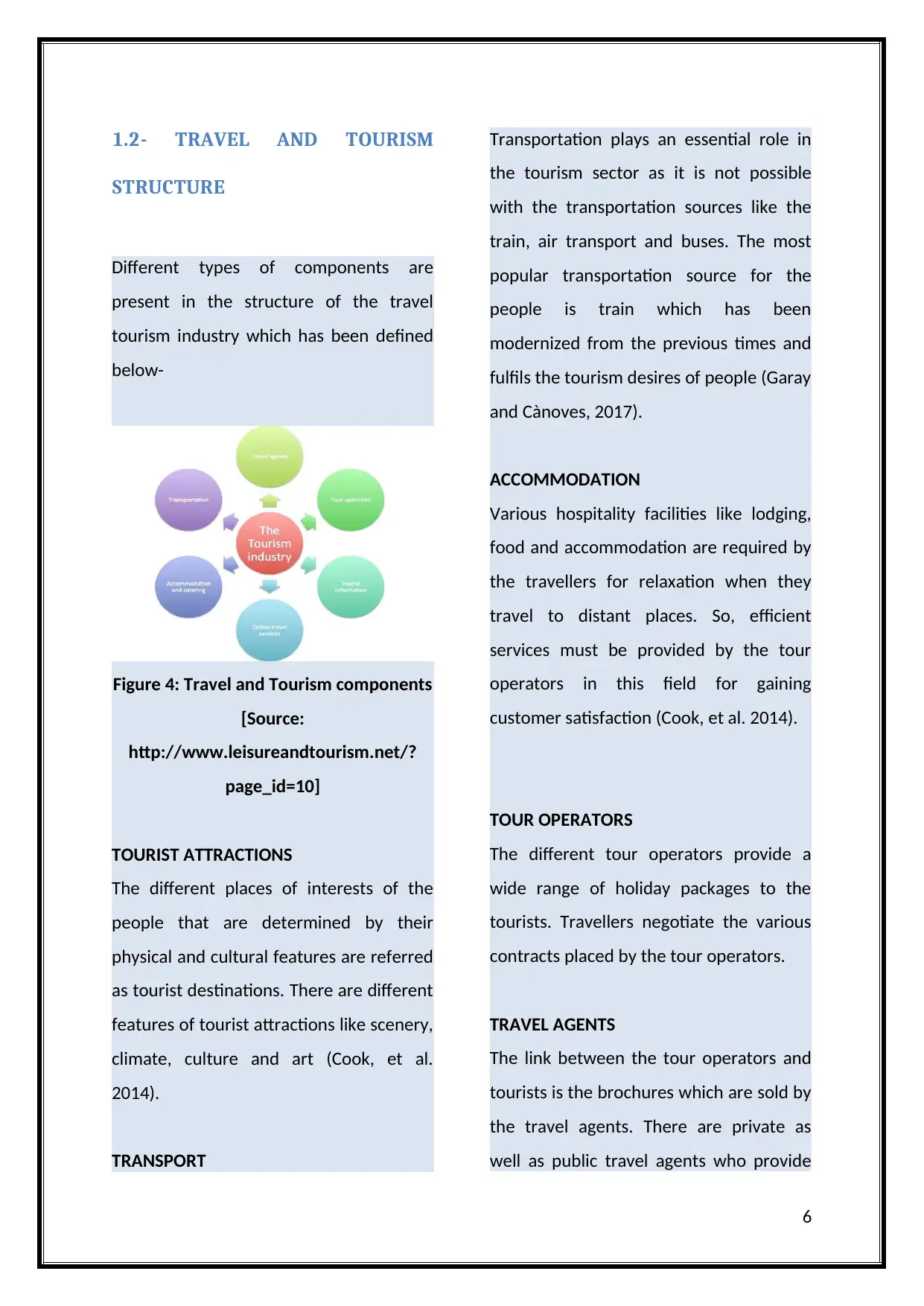
1.2- TRAVEL AND TOURISM
STRUCTURE
Different types of components are
present in the structure of the travel
tourism industry which has been defined
below-
Figure 4: Travel and Tourism components
[Source:
http://www.leisureandtourism.net/?
page_id=10]
TOURIST ATTRACTIONS
The different places of interests of the
people that are determined by their
physical and cultural features are referred
as tourist destinations. There are different
features of tourist attractions like scenery,
climate, culture and art (Cook, et al.
2014).
TRANSPORT
Transportation plays an essential role in
the tourism sector as it is not possible
with the transportation sources like the
train, air transport and buses. The most
popular transportation source for the
people is train which has been
modernized from the previous times and
fulfils the tourism desires of people (Garay
and Cànoves, 2017).
ACCOMMODATION
Various hospitality facilities like lodging,
food and accommodation are required by
the travellers for relaxation when they
travel to distant places. So, efficient
services must be provided by the tour
operators in this field for gaining
customer satisfaction (Cook, et al. 2014).
TOUR OPERATORS
The different tour operators provide a
wide range of holiday packages to the
tourists. Travellers negotiate the various
contracts placed by the tour operators.
TRAVEL AGENTS
The link between the tour operators and
tourists is the brochures which are sold by
the travel agents. There are private as
well as public travel agents who provide
6
STRUCTURE
Different types of components are
present in the structure of the travel
tourism industry which has been defined
below-
Figure 4: Travel and Tourism components
[Source:
http://www.leisureandtourism.net/?
page_id=10]
TOURIST ATTRACTIONS
The different places of interests of the
people that are determined by their
physical and cultural features are referred
as tourist destinations. There are different
features of tourist attractions like scenery,
climate, culture and art (Cook, et al.
2014).
TRANSPORT
Transportation plays an essential role in
the tourism sector as it is not possible
with the transportation sources like the
train, air transport and buses. The most
popular transportation source for the
people is train which has been
modernized from the previous times and
fulfils the tourism desires of people (Garay
and Cànoves, 2017).
ACCOMMODATION
Various hospitality facilities like lodging,
food and accommodation are required by
the travellers for relaxation when they
travel to distant places. So, efficient
services must be provided by the tour
operators in this field for gaining
customer satisfaction (Cook, et al. 2014).
TOUR OPERATORS
The different tour operators provide a
wide range of holiday packages to the
tourists. Travellers negotiate the various
contracts placed by the tour operators.
TRAVEL AGENTS
The link between the tour operators and
tourists is the brochures which are sold by
the travel agents. There are private as
well as public travel agents who provide
6
Paraphrase This Document
Need a fresh take? Get an instant paraphrase of this document with our AI Paraphraser
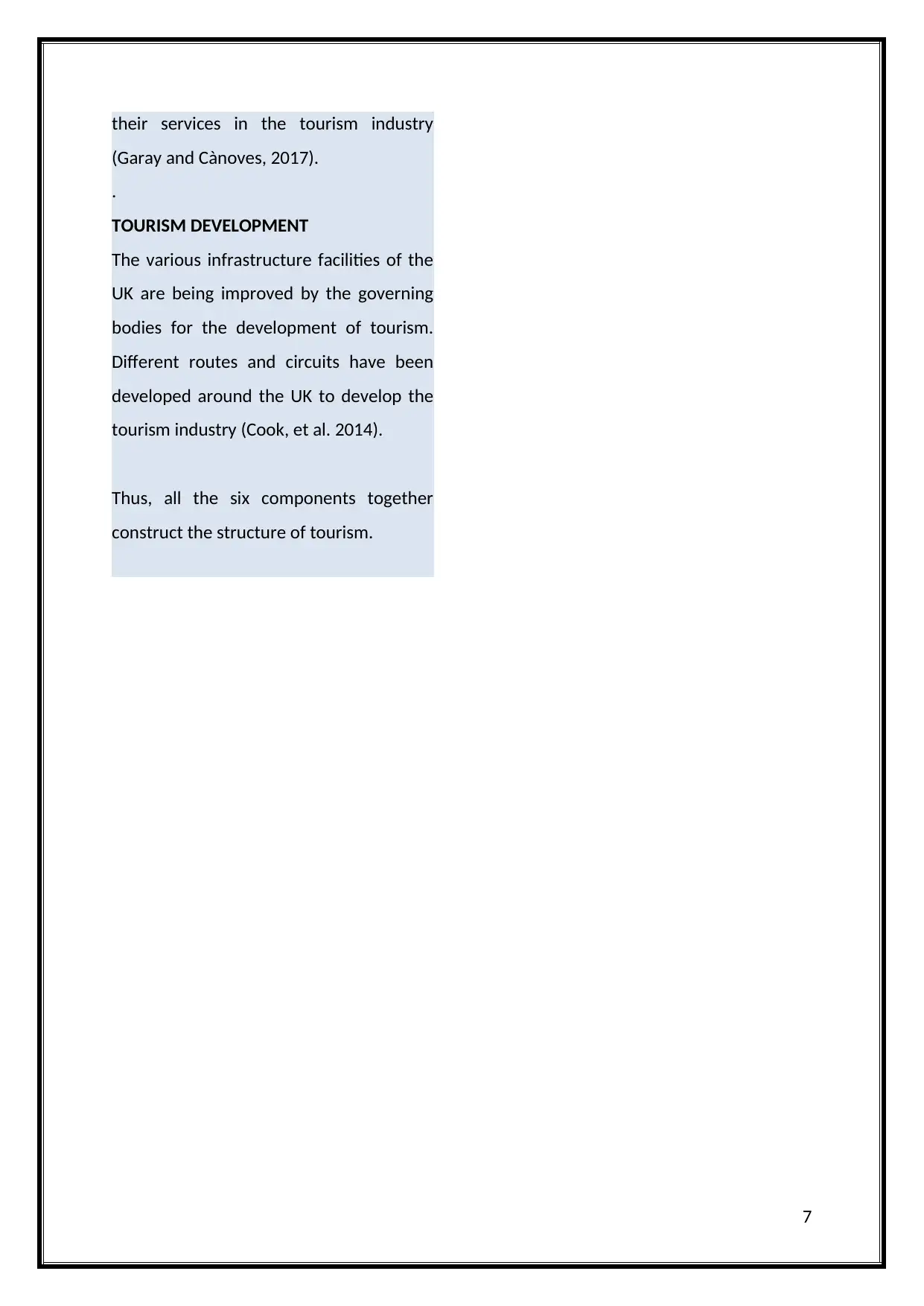
their services in the tourism industry
(Garay and Cànoves, 2017).
.
TOURISM DEVELOPMENT
The various infrastructure facilities of the
UK are being improved by the governing
bodies for the development of tourism.
Different routes and circuits have been
developed around the UK to develop the
tourism industry (Cook, et al. 2014).
Thus, all the six components together
construct the structure of tourism.
7
(Garay and Cànoves, 2017).
.
TOURISM DEVELOPMENT
The various infrastructure facilities of the
UK are being improved by the governing
bodies for the development of tourism.
Different routes and circuits have been
developed around the UK to develop the
tourism industry (Cook, et al. 2014).
Thus, all the six components together
construct the structure of tourism.
7
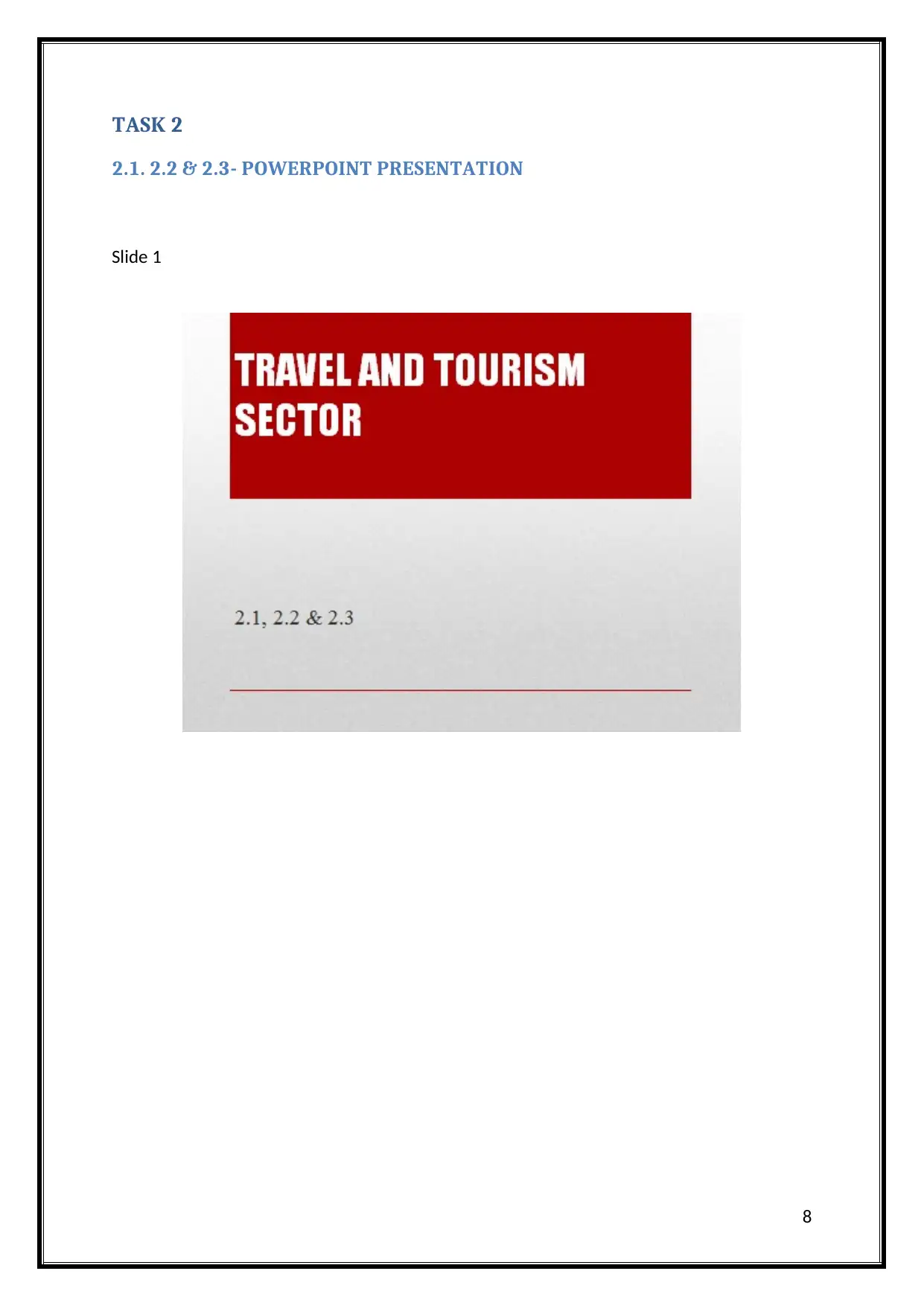
TASK 2
2.1. 2.2 & 2.3- POWERPOINT PRESENTATION
Slide 1
8
2.1. 2.2 & 2.3- POWERPOINT PRESENTATION
Slide 1
8
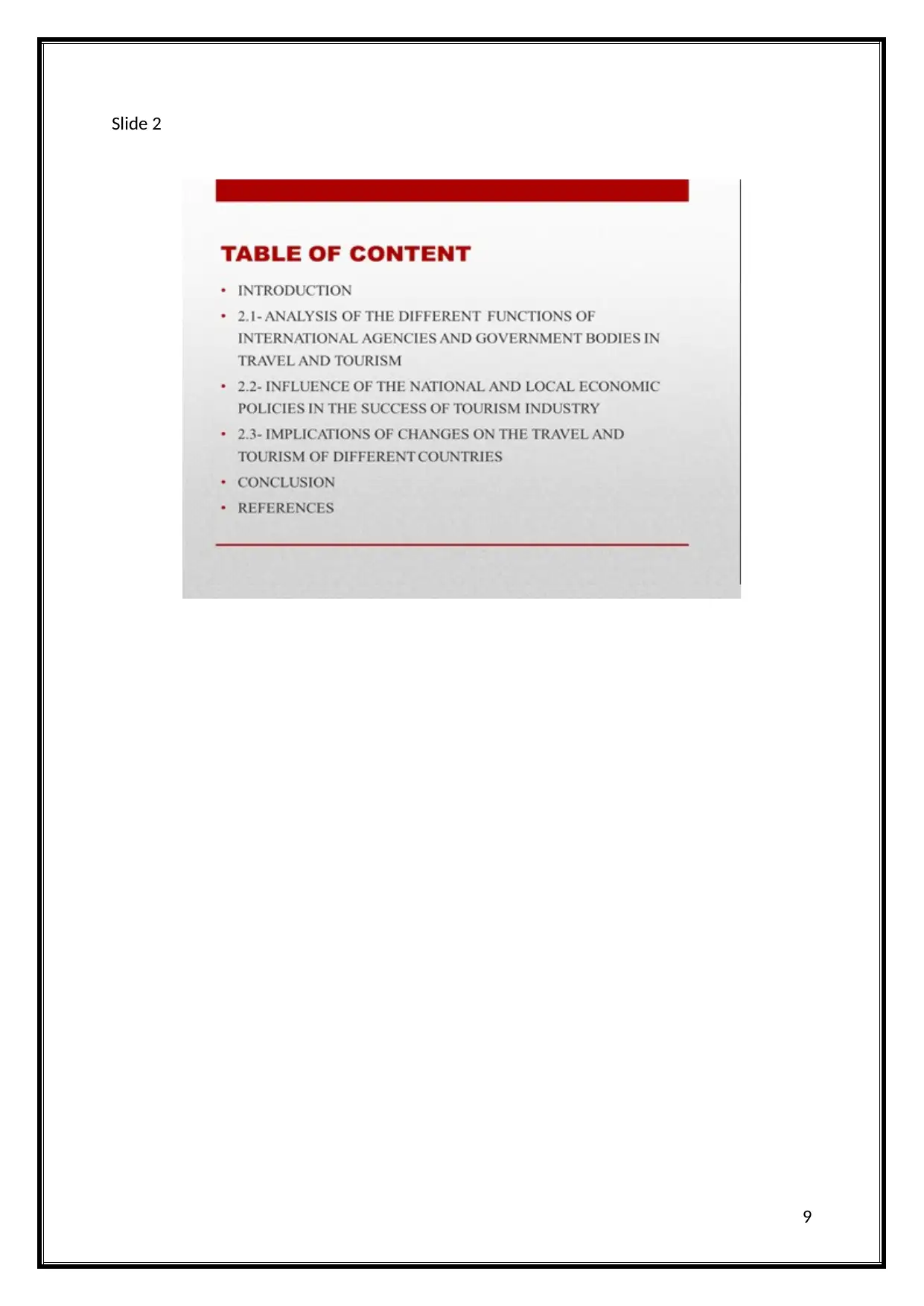
Slide 2
9
9
Secure Best Marks with AI Grader
Need help grading? Try our AI Grader for instant feedback on your assignments.
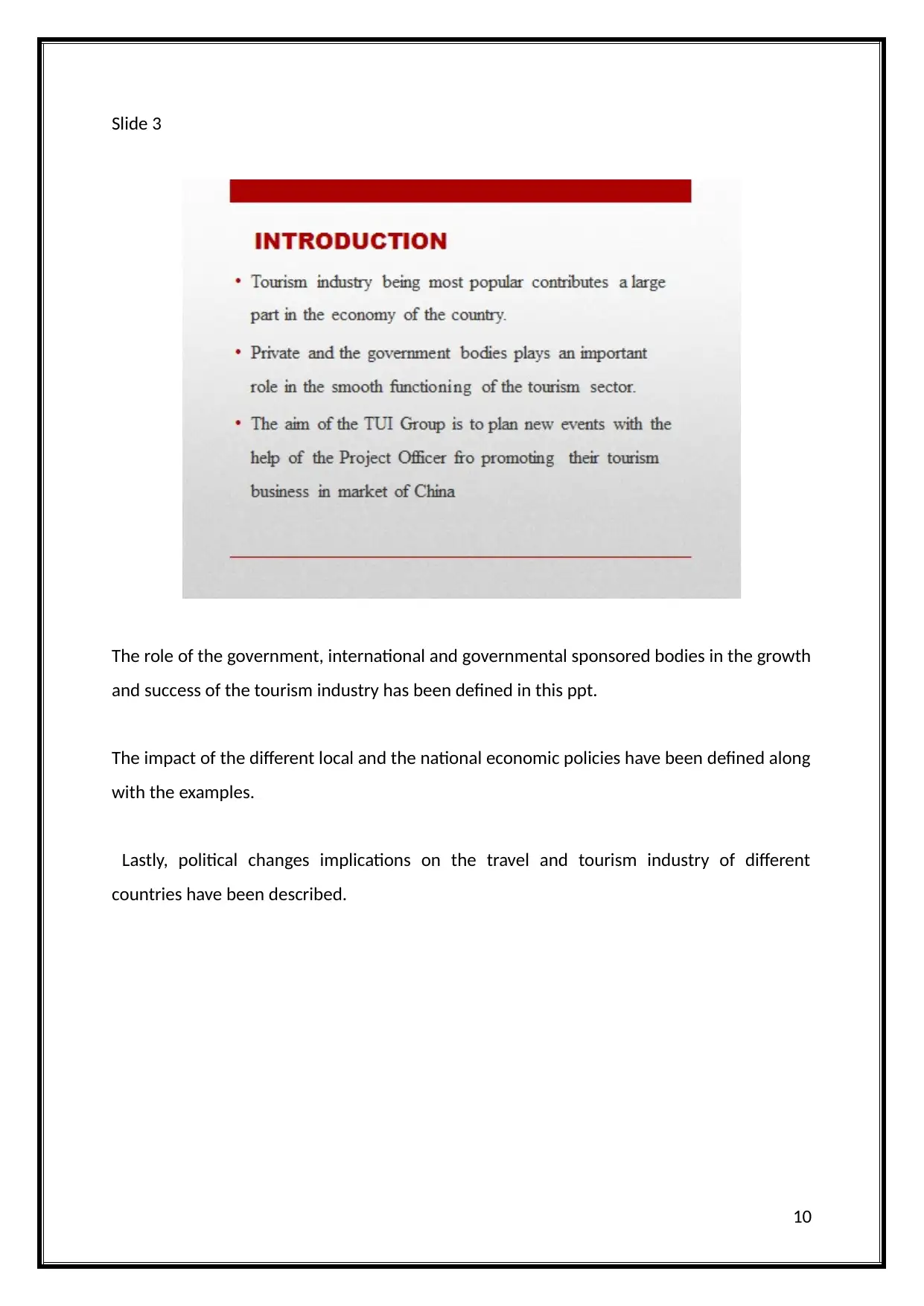
Slide 3
The role of the government, international and governmental sponsored bodies in the growth
and success of the tourism industry has been defined in this ppt.
The impact of the different local and the national economic policies have been defined along
with the examples.
Lastly, political changes implications on the travel and tourism industry of different
countries have been described.
10
The role of the government, international and governmental sponsored bodies in the growth
and success of the tourism industry has been defined in this ppt.
The impact of the different local and the national economic policies have been defined along
with the examples.
Lastly, political changes implications on the travel and tourism industry of different
countries have been described.
10
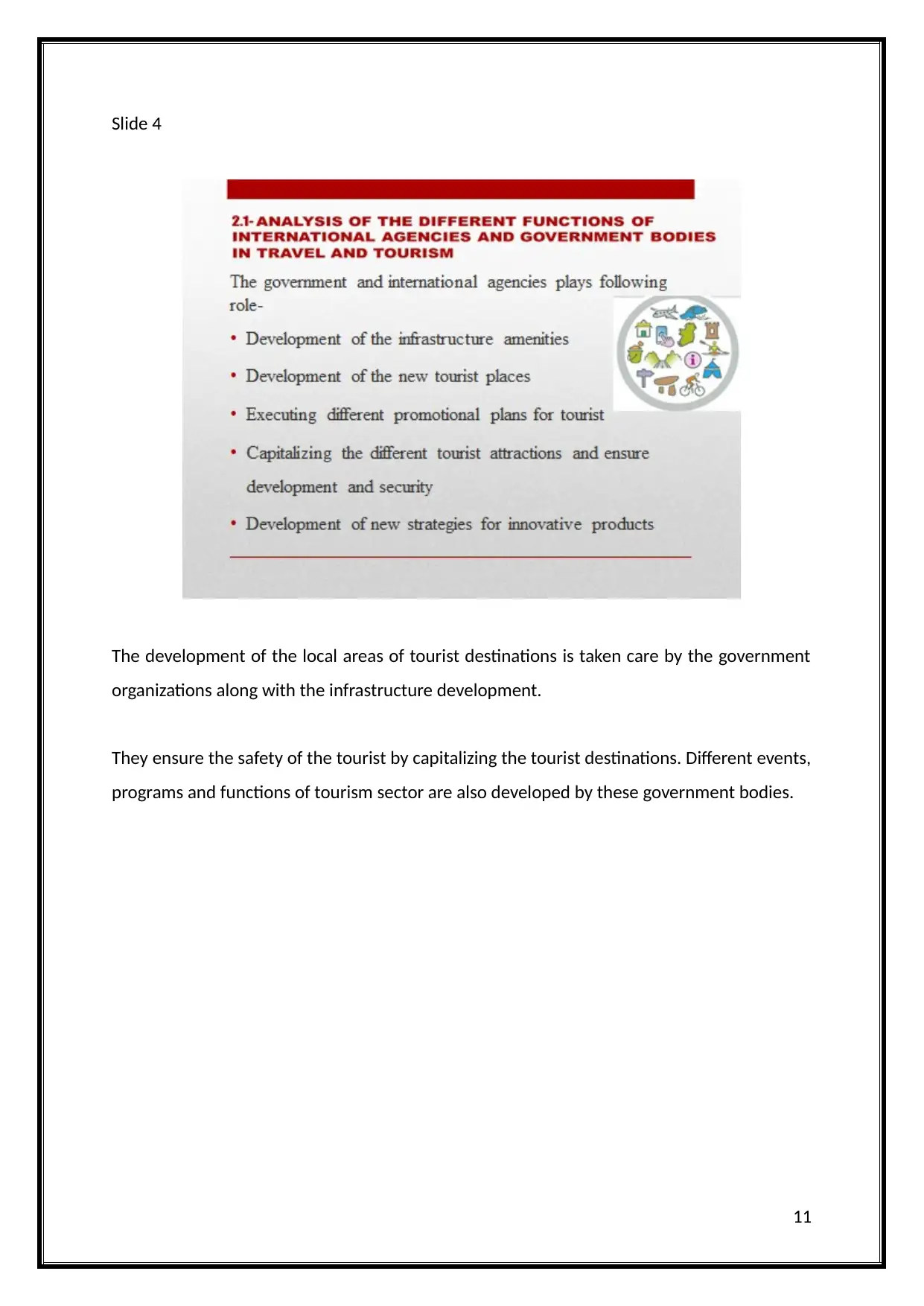
Slide 4
The development of the local areas of tourist destinations is taken care by the government
organizations along with the infrastructure development.
They ensure the safety of the tourist by capitalizing the tourist destinations. Different events,
programs and functions of tourism sector are also developed by these government bodies.
11
The development of the local areas of tourist destinations is taken care by the government
organizations along with the infrastructure development.
They ensure the safety of the tourist by capitalizing the tourist destinations. Different events,
programs and functions of tourism sector are also developed by these government bodies.
11
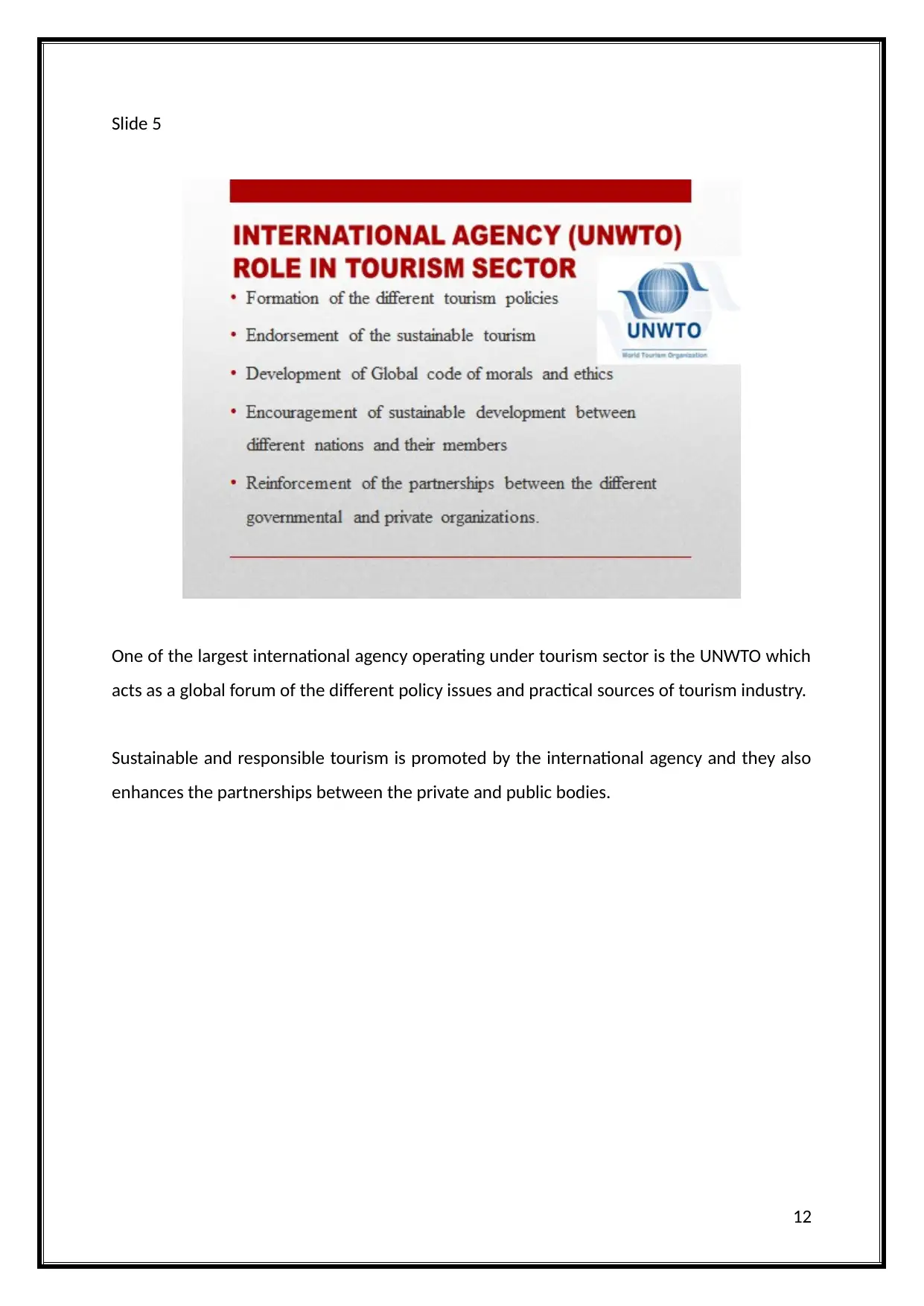
Slide 5
One of the largest international agency operating under tourism sector is the UNWTO which
acts as a global forum of the different policy issues and practical sources of tourism industry.
Sustainable and responsible tourism is promoted by the international agency and they also
enhances the partnerships between the private and public bodies.
12
One of the largest international agency operating under tourism sector is the UNWTO which
acts as a global forum of the different policy issues and practical sources of tourism industry.
Sustainable and responsible tourism is promoted by the international agency and they also
enhances the partnerships between the private and public bodies.
12
Paraphrase This Document
Need a fresh take? Get an instant paraphrase of this document with our AI Paraphraser
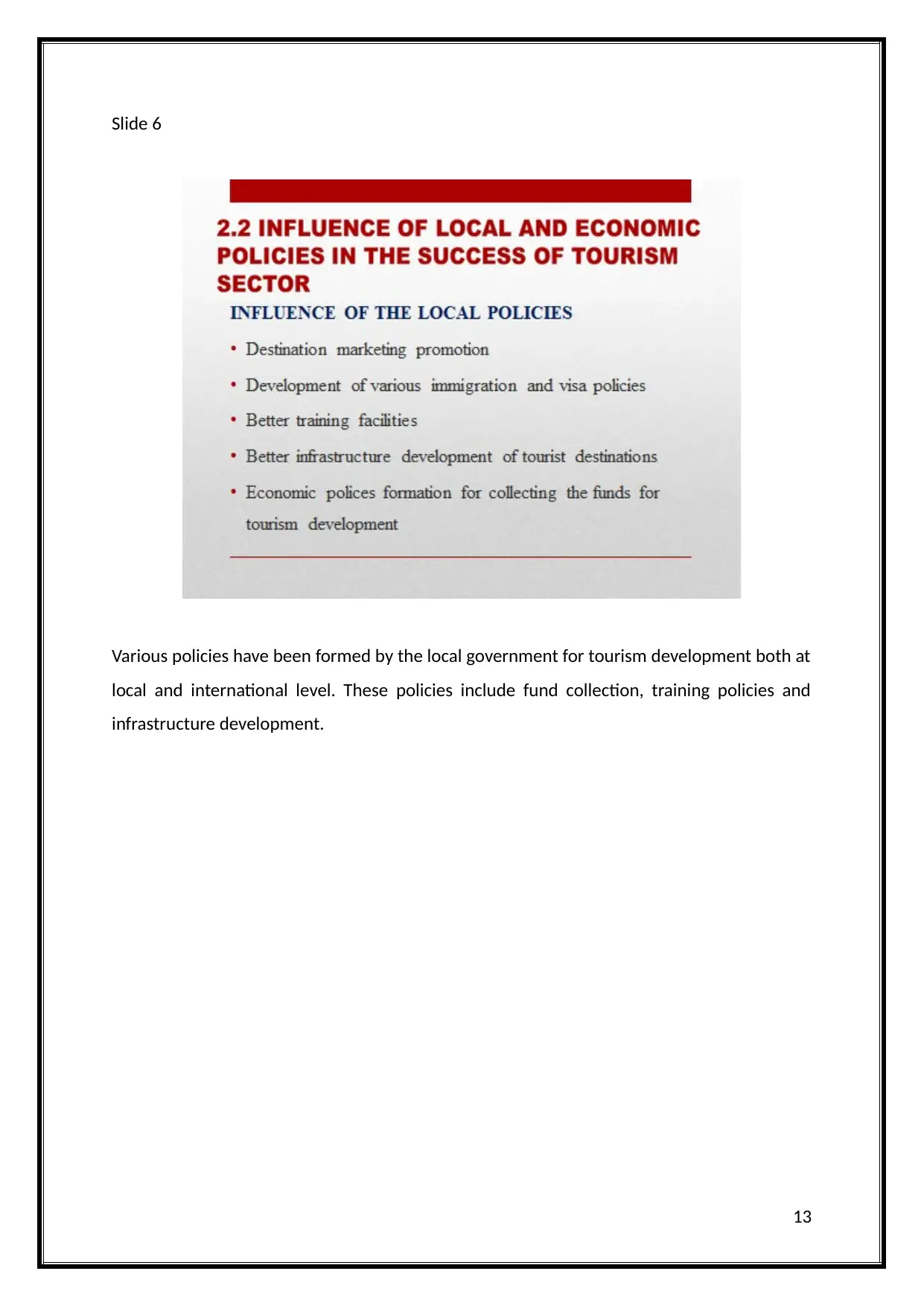
Slide 6
Various policies have been formed by the local government for tourism development both at
local and international level. These policies include fund collection, training policies and
infrastructure development.
13
Various policies have been formed by the local government for tourism development both at
local and international level. These policies include fund collection, training policies and
infrastructure development.
13
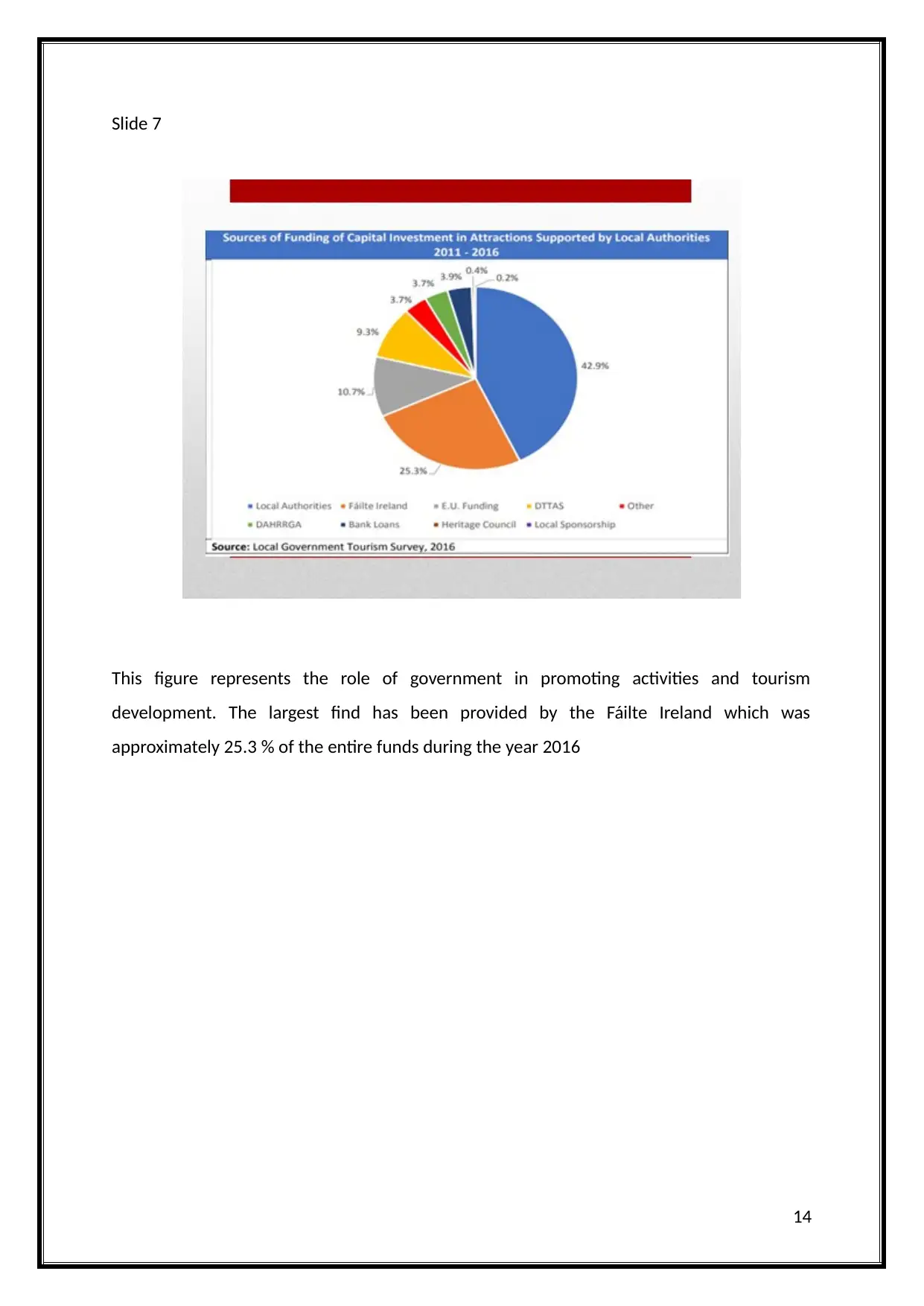
Slide 7
This figure represents the role of government in promoting activities and tourism
development. The largest find has been provided by the Fáilte Ireland which was
approximately 25.3 % of the entire funds during the year 2016
14
This figure represents the role of government in promoting activities and tourism
development. The largest find has been provided by the Fáilte Ireland which was
approximately 25.3 % of the entire funds during the year 2016
14
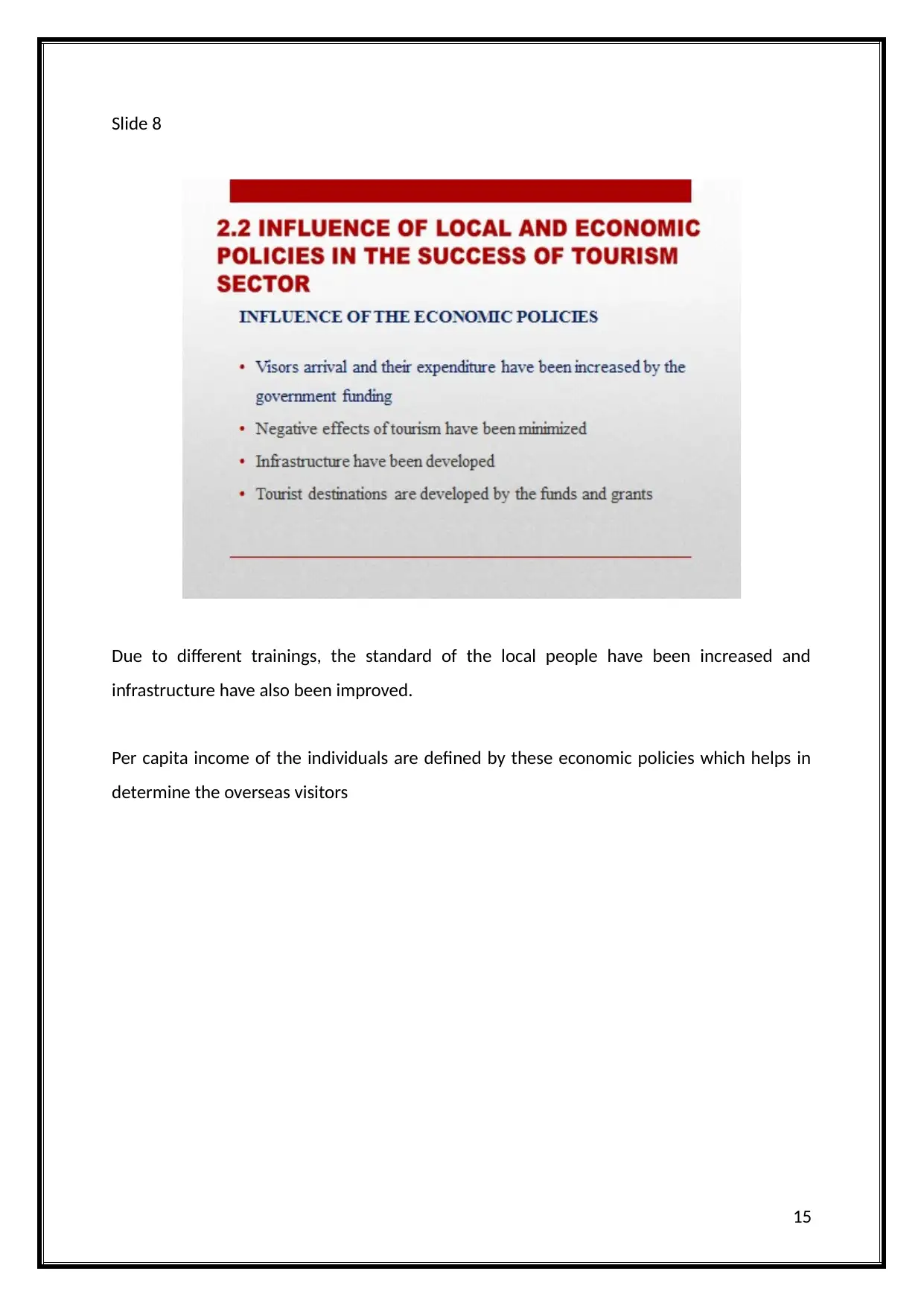
Slide 8
Due to different trainings, the standard of the local people have been increased and
infrastructure have also been improved.
Per capita income of the individuals are defined by these economic policies which helps in
determine the overseas visitors
15
Due to different trainings, the standard of the local people have been increased and
infrastructure have also been improved.
Per capita income of the individuals are defined by these economic policies which helps in
determine the overseas visitors
15
Secure Best Marks with AI Grader
Need help grading? Try our AI Grader for instant feedback on your assignments.
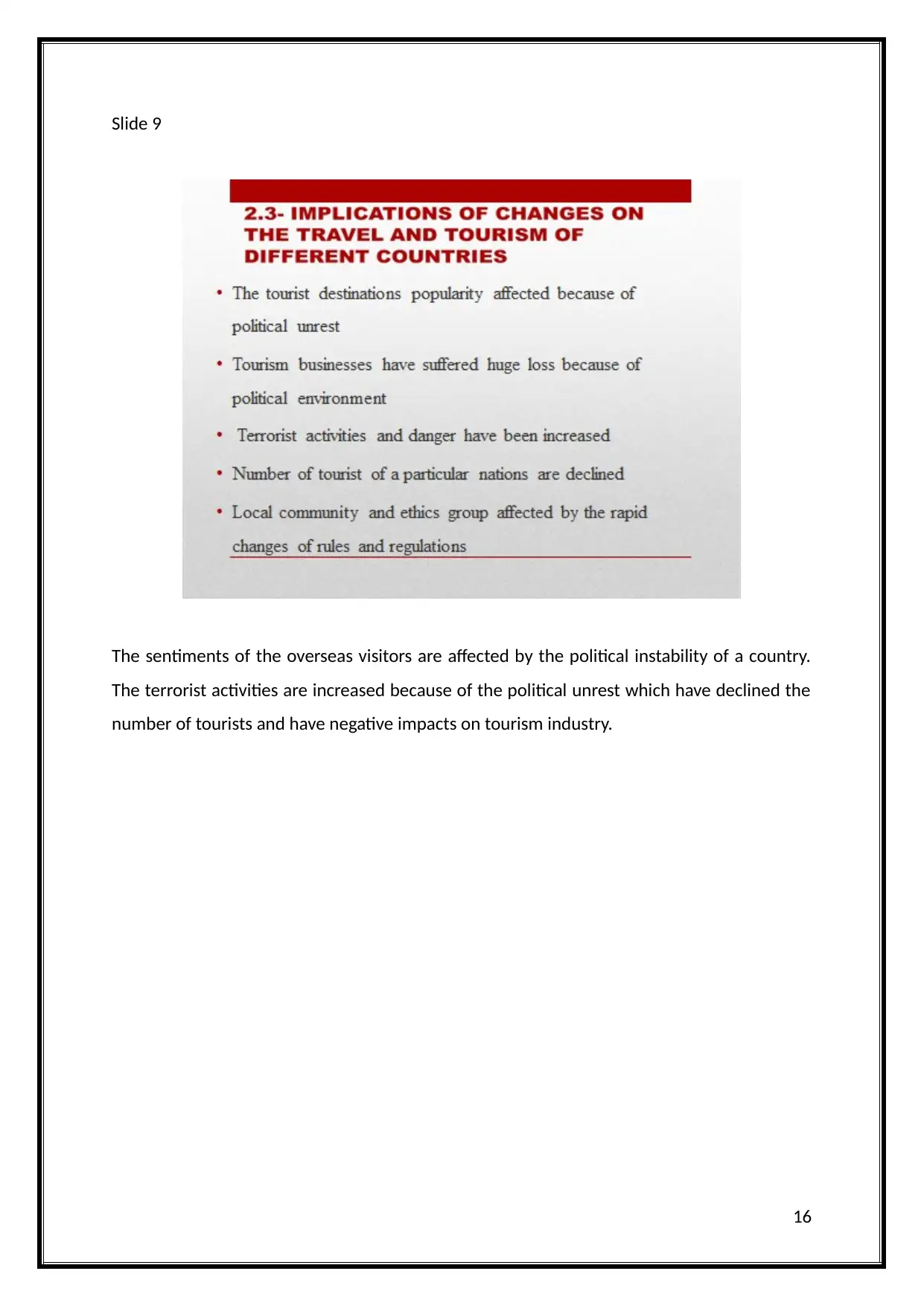
Slide 9
The sentiments of the overseas visitors are affected by the political instability of a country.
The terrorist activities are increased because of the political unrest which have declined the
number of tourists and have negative impacts on tourism industry.
16
The sentiments of the overseas visitors are affected by the political instability of a country.
The terrorist activities are increased because of the political unrest which have declined the
number of tourists and have negative impacts on tourism industry.
16
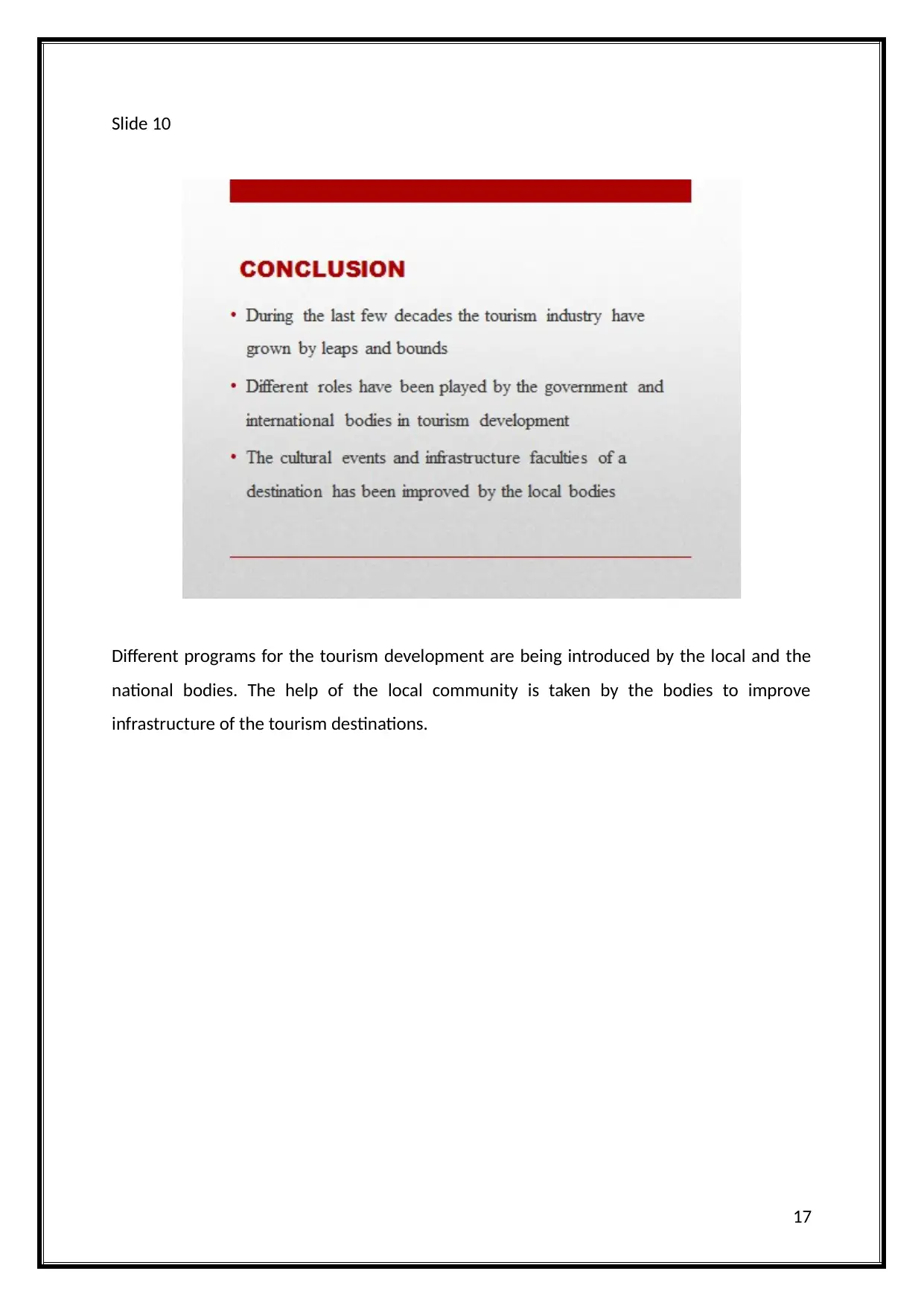
Slide 10
Different programs for the tourism development are being introduced by the local and the
national bodies. The help of the local community is taken by the bodies to improve
infrastructure of the tourism destinations.
17
Different programs for the tourism development are being introduced by the local and the
national bodies. The help of the local community is taken by the bodies to improve
infrastructure of the tourism destinations.
17
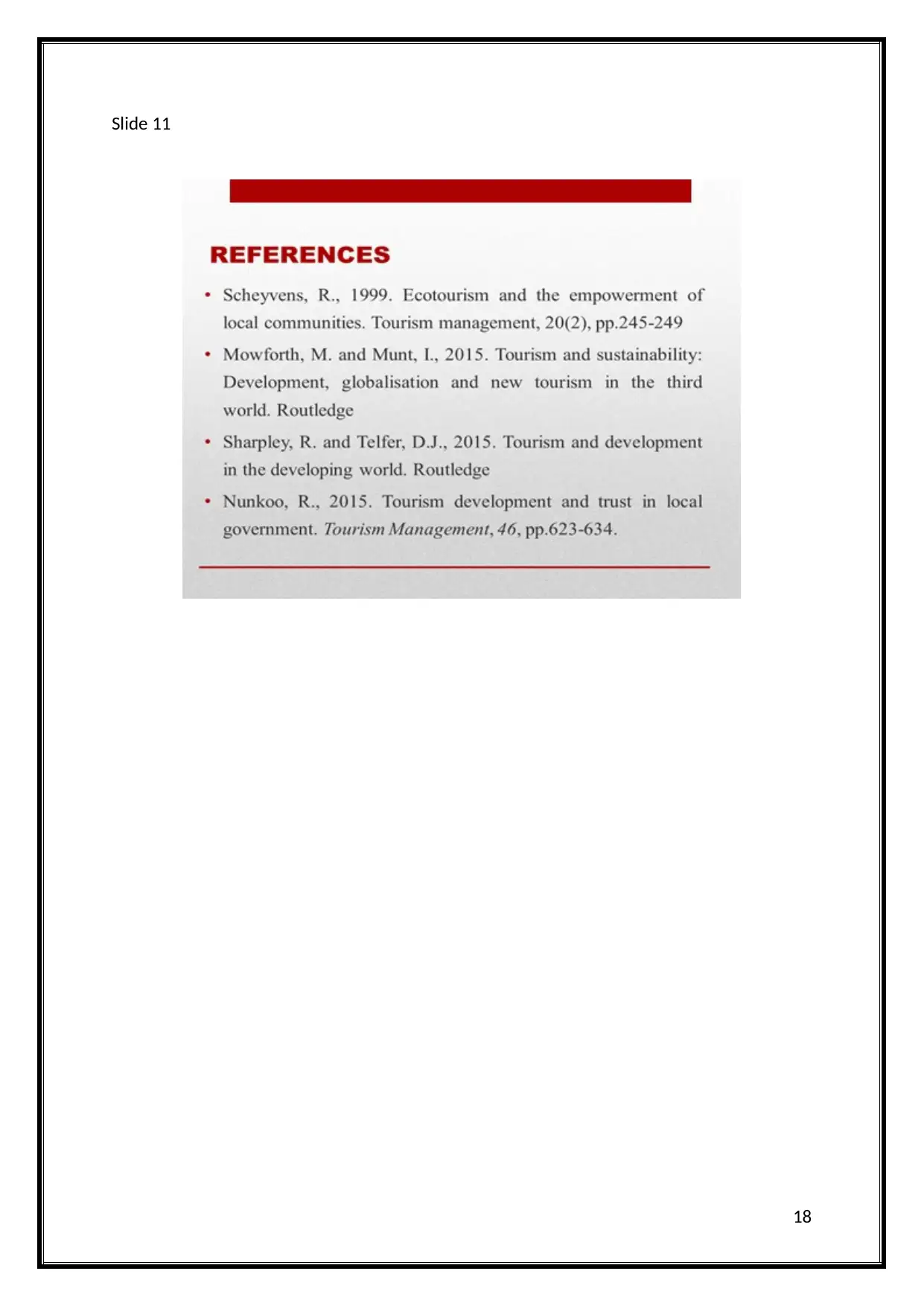
Slide 11
18
18
Paraphrase This Document
Need a fresh take? Get an instant paraphrase of this document with our AI Paraphraser
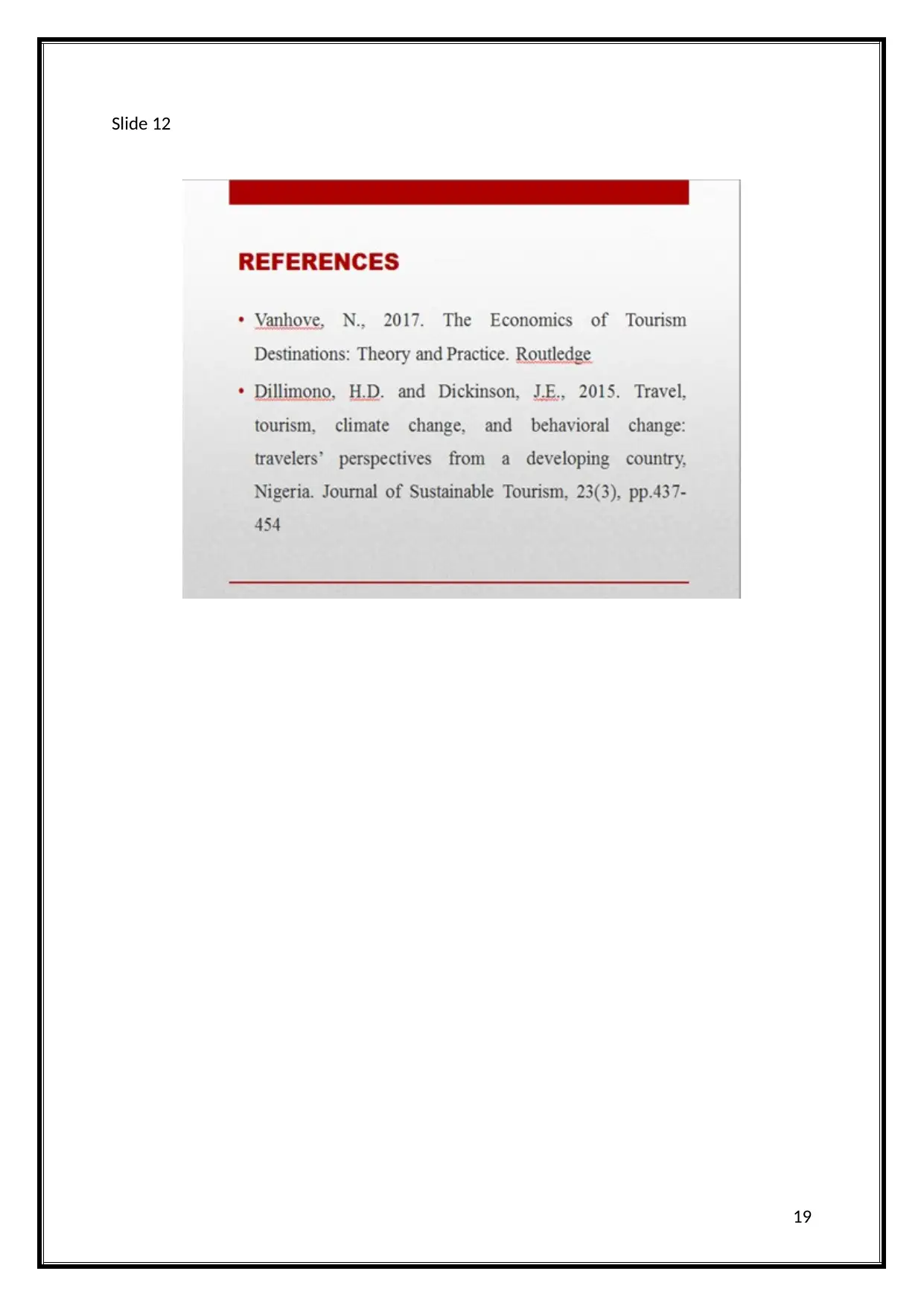
Slide 12
19
19
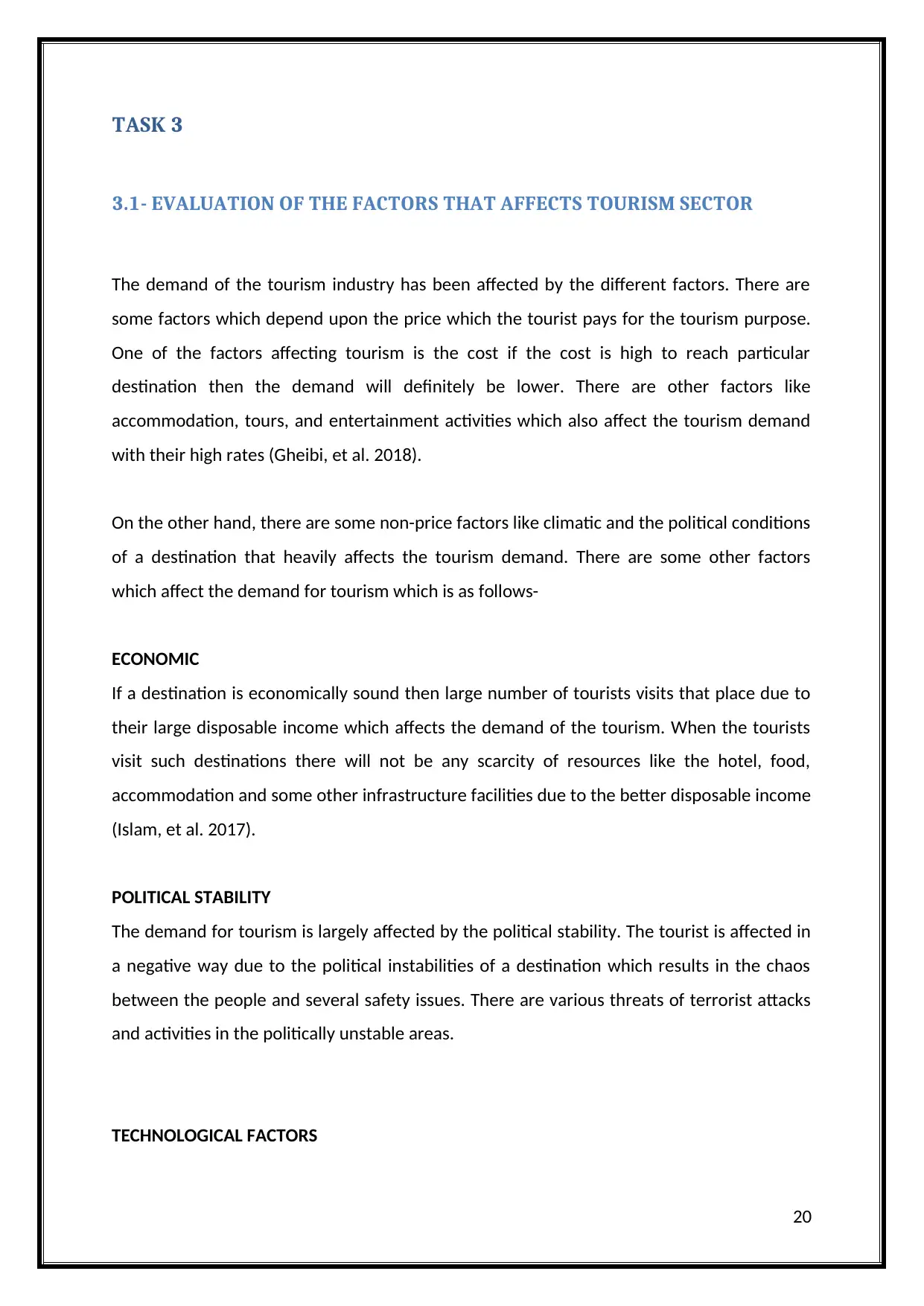
TASK 3
3.1- EVALUATION OF THE FACTORS THAT AFFECTS TOURISM SECTOR
The demand of the tourism industry has been affected by the different factors. There are
some factors which depend upon the price which the tourist pays for the tourism purpose.
One of the factors affecting tourism is the cost if the cost is high to reach particular
destination then the demand will definitely be lower. There are other factors like
accommodation, tours, and entertainment activities which also affect the tourism demand
with their high rates (Gheibi, et al. 2018).
On the other hand, there are some non-price factors like climatic and the political conditions
of a destination that heavily affects the tourism demand. There are some other factors
which affect the demand for tourism which is as follows-
ECONOMIC
If a destination is economically sound then large number of tourists visits that place due to
their large disposable income which affects the demand of the tourism. When the tourists
visit such destinations there will not be any scarcity of resources like the hotel, food,
accommodation and some other infrastructure facilities due to the better disposable income
(Islam, et al. 2017).
POLITICAL STABILITY
The demand for tourism is largely affected by the political stability. The tourist is affected in
a negative way due to the political instabilities of a destination which results in the chaos
between the people and several safety issues. There are various threats of terrorist attacks
and activities in the politically unstable areas.
TECHNOLOGICAL FACTORS
20
3.1- EVALUATION OF THE FACTORS THAT AFFECTS TOURISM SECTOR
The demand of the tourism industry has been affected by the different factors. There are
some factors which depend upon the price which the tourist pays for the tourism purpose.
One of the factors affecting tourism is the cost if the cost is high to reach particular
destination then the demand will definitely be lower. There are other factors like
accommodation, tours, and entertainment activities which also affect the tourism demand
with their high rates (Gheibi, et al. 2018).
On the other hand, there are some non-price factors like climatic and the political conditions
of a destination that heavily affects the tourism demand. There are some other factors
which affect the demand for tourism which is as follows-
ECONOMIC
If a destination is economically sound then large number of tourists visits that place due to
their large disposable income which affects the demand of the tourism. When the tourists
visit such destinations there will not be any scarcity of resources like the hotel, food,
accommodation and some other infrastructure facilities due to the better disposable income
(Islam, et al. 2017).
POLITICAL STABILITY
The demand for tourism is largely affected by the political stability. The tourist is affected in
a negative way due to the political instabilities of a destination which results in the chaos
between the people and several safety issues. There are various threats of terrorist attacks
and activities in the politically unstable areas.
TECHNOLOGICAL FACTORS
20
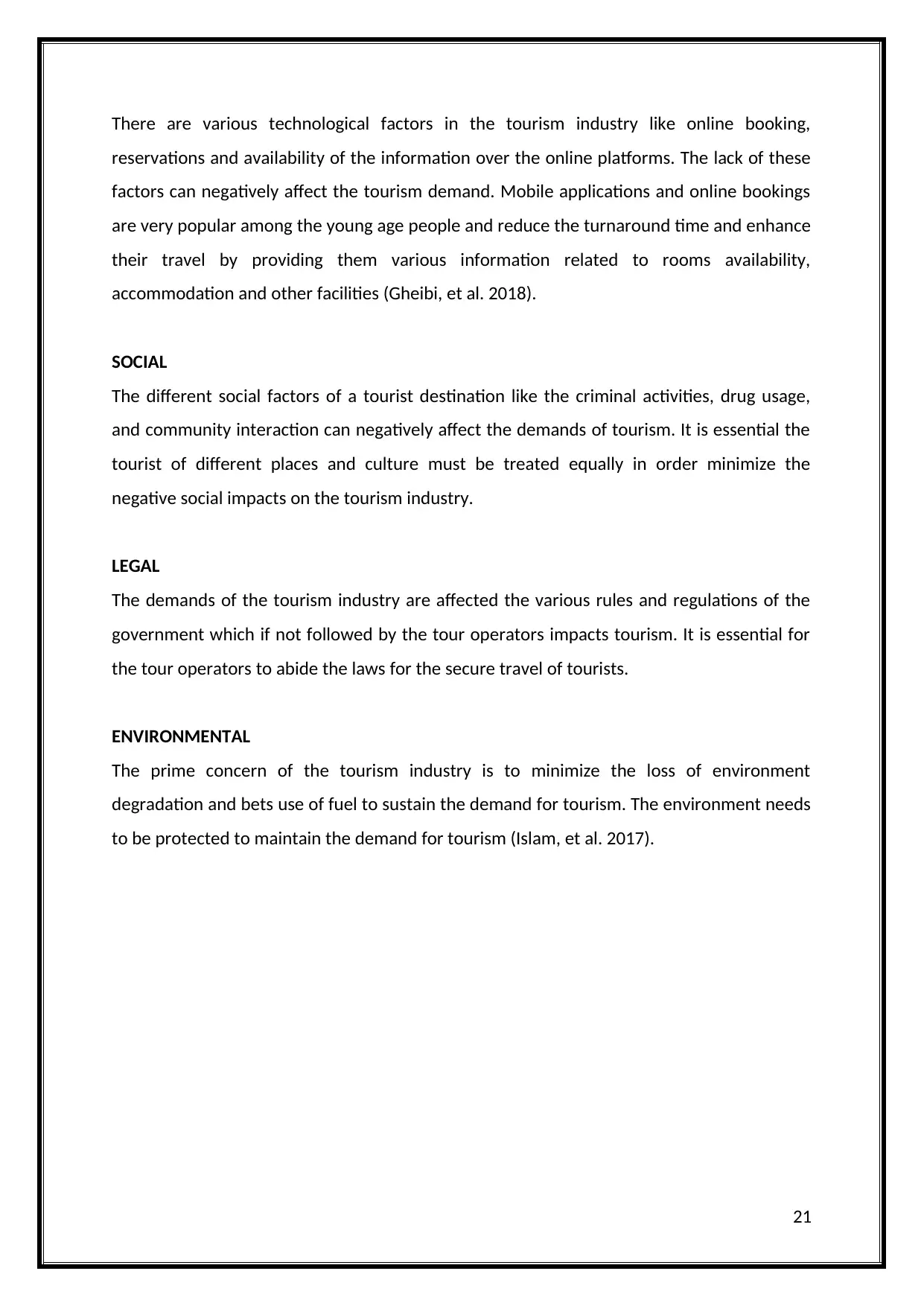
There are various technological factors in the tourism industry like online booking,
reservations and availability of the information over the online platforms. The lack of these
factors can negatively affect the tourism demand. Mobile applications and online bookings
are very popular among the young age people and reduce the turnaround time and enhance
their travel by providing them various information related to rooms availability,
accommodation and other facilities (Gheibi, et al. 2018).
SOCIAL
The different social factors of a tourist destination like the criminal activities, drug usage,
and community interaction can negatively affect the demands of tourism. It is essential the
tourist of different places and culture must be treated equally in order minimize the
negative social impacts on the tourism industry.
LEGAL
The demands of the tourism industry are affected the various rules and regulations of the
government which if not followed by the tour operators impacts tourism. It is essential for
the tour operators to abide the laws for the secure travel of tourists.
ENVIRONMENTAL
The prime concern of the tourism industry is to minimize the loss of environment
degradation and bets use of fuel to sustain the demand for tourism. The environment needs
to be protected to maintain the demand for tourism (Islam, et al. 2017).
21
reservations and availability of the information over the online platforms. The lack of these
factors can negatively affect the tourism demand. Mobile applications and online bookings
are very popular among the young age people and reduce the turnaround time and enhance
their travel by providing them various information related to rooms availability,
accommodation and other facilities (Gheibi, et al. 2018).
SOCIAL
The different social factors of a tourist destination like the criminal activities, drug usage,
and community interaction can negatively affect the demands of tourism. It is essential the
tourist of different places and culture must be treated equally in order minimize the
negative social impacts on the tourism industry.
LEGAL
The demands of the tourism industry are affected the various rules and regulations of the
government which if not followed by the tour operators impacts tourism. It is essential for
the tour operators to abide the laws for the secure travel of tourists.
ENVIRONMENTAL
The prime concern of the tourism industry is to minimize the loss of environment
degradation and bets use of fuel to sustain the demand for tourism. The environment needs
to be protected to maintain the demand for tourism (Islam, et al. 2017).
21
Secure Best Marks with AI Grader
Need help grading? Try our AI Grader for instant feedback on your assignments.
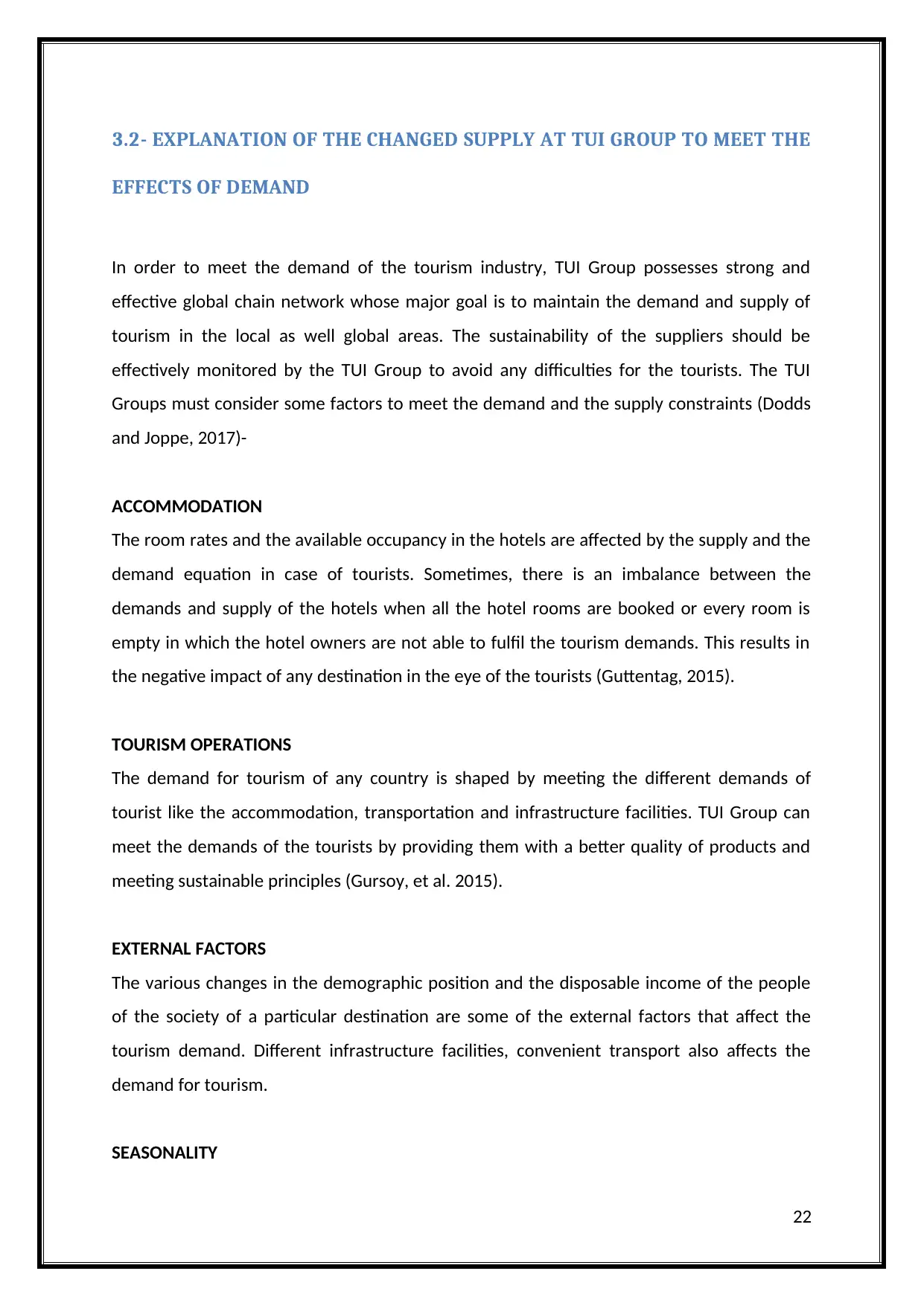
3.2- EXPLANATION OF THE CHANGED SUPPLY AT TUI GROUP TO MEET THE
EFFECTS OF DEMAND
In order to meet the demand of the tourism industry, TUI Group possesses strong and
effective global chain network whose major goal is to maintain the demand and supply of
tourism in the local as well global areas. The sustainability of the suppliers should be
effectively monitored by the TUI Group to avoid any difficulties for the tourists. The TUI
Groups must consider some factors to meet the demand and the supply constraints (Dodds
and Joppe, 2017)-
ACCOMMODATION
The room rates and the available occupancy in the hotels are affected by the supply and the
demand equation in case of tourists. Sometimes, there is an imbalance between the
demands and supply of the hotels when all the hotel rooms are booked or every room is
empty in which the hotel owners are not able to fulfil the tourism demands. This results in
the negative impact of any destination in the eye of the tourists (Guttentag, 2015).
TOURISM OPERATIONS
The demand for tourism of any country is shaped by meeting the different demands of
tourist like the accommodation, transportation and infrastructure facilities. TUI Group can
meet the demands of the tourists by providing them with a better quality of products and
meeting sustainable principles (Gursoy, et al. 2015).
EXTERNAL FACTORS
The various changes in the demographic position and the disposable income of the people
of the society of a particular destination are some of the external factors that affect the
tourism demand. Different infrastructure facilities, convenient transport also affects the
demand for tourism.
SEASONALITY
22
EFFECTS OF DEMAND
In order to meet the demand of the tourism industry, TUI Group possesses strong and
effective global chain network whose major goal is to maintain the demand and supply of
tourism in the local as well global areas. The sustainability of the suppliers should be
effectively monitored by the TUI Group to avoid any difficulties for the tourists. The TUI
Groups must consider some factors to meet the demand and the supply constraints (Dodds
and Joppe, 2017)-
ACCOMMODATION
The room rates and the available occupancy in the hotels are affected by the supply and the
demand equation in case of tourists. Sometimes, there is an imbalance between the
demands and supply of the hotels when all the hotel rooms are booked or every room is
empty in which the hotel owners are not able to fulfil the tourism demands. This results in
the negative impact of any destination in the eye of the tourists (Guttentag, 2015).
TOURISM OPERATIONS
The demand for tourism of any country is shaped by meeting the different demands of
tourist like the accommodation, transportation and infrastructure facilities. TUI Group can
meet the demands of the tourists by providing them with a better quality of products and
meeting sustainable principles (Gursoy, et al. 2015).
EXTERNAL FACTORS
The various changes in the demographic position and the disposable income of the people
of the society of a particular destination are some of the external factors that affect the
tourism demand. Different infrastructure facilities, convenient transport also affects the
demand for tourism.
SEASONALITY
22
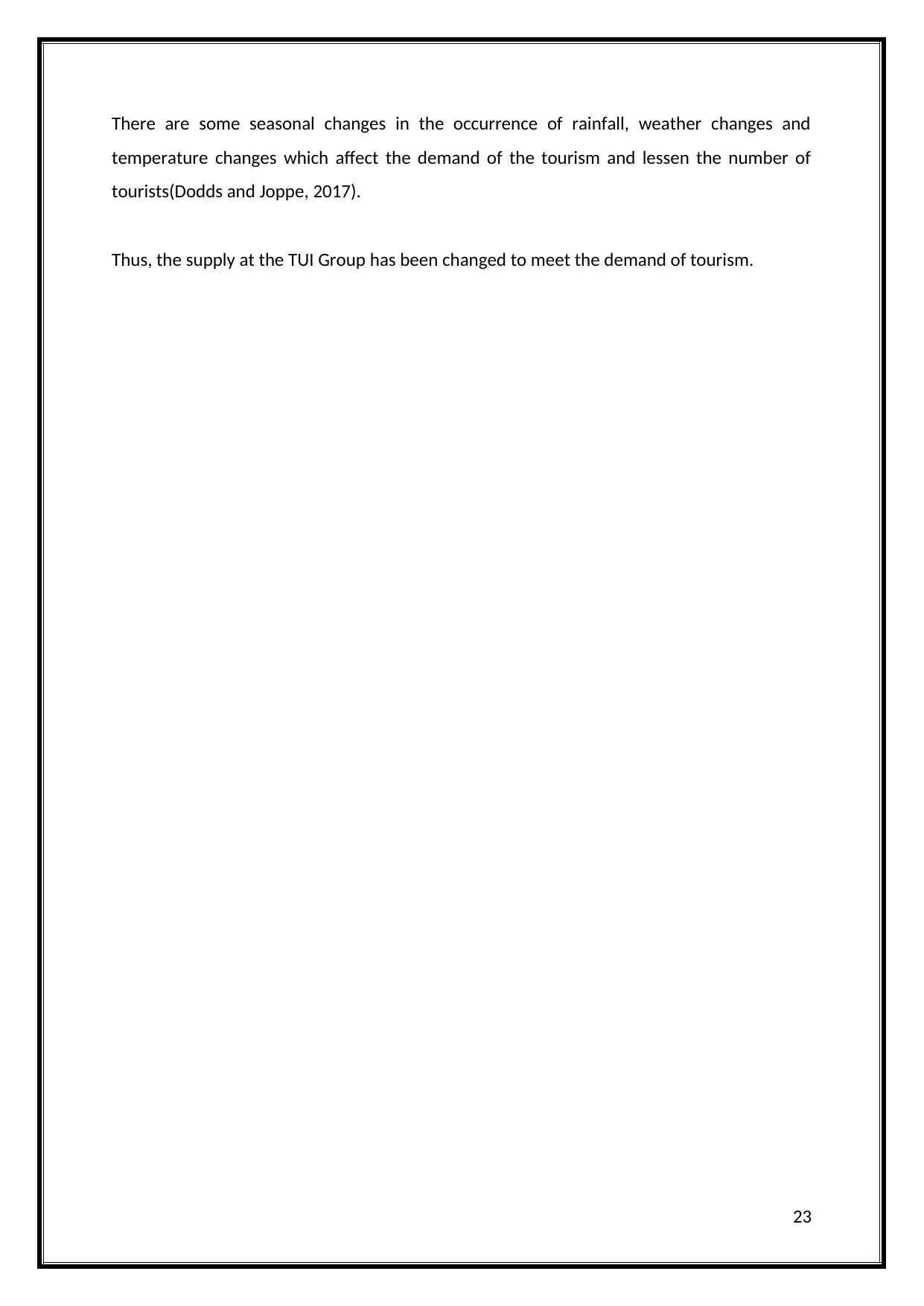
There are some seasonal changes in the occurrence of rainfall, weather changes and
temperature changes which affect the demand of the tourism and lessen the number of
tourists(Dodds and Joppe, 2017).
Thus, the supply at the TUI Group has been changed to meet the demand of tourism.
23
temperature changes which affect the demand of the tourism and lessen the number of
tourists(Dodds and Joppe, 2017).
Thus, the supply at the TUI Group has been changed to meet the demand of tourism.
23
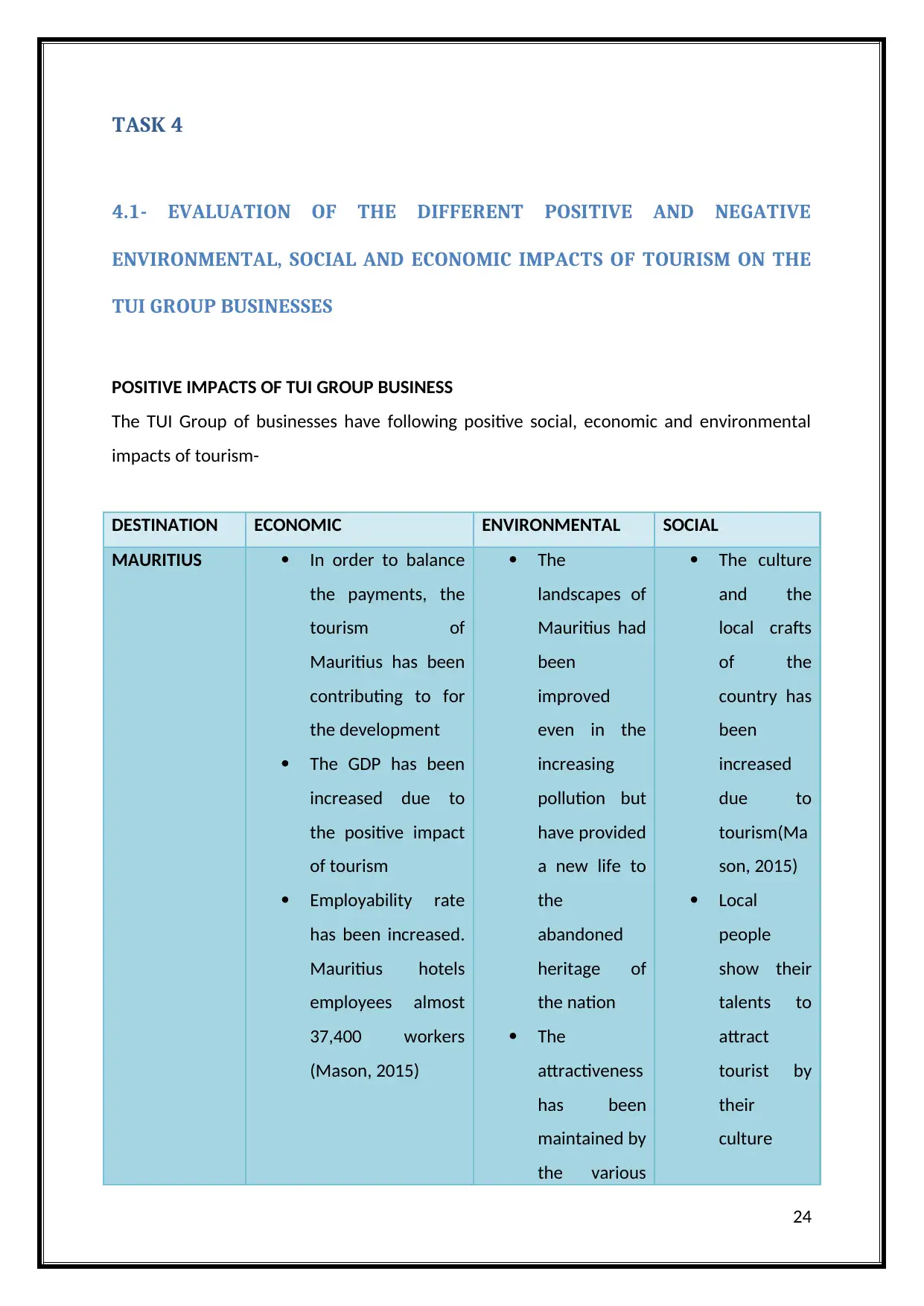
TASK 4
4.1- EVALUATION OF THE DIFFERENT POSITIVE AND NEGATIVE
ENVIRONMENTAL, SOCIAL AND ECONOMIC IMPACTS OF TOURISM ON THE
TUI GROUP BUSINESSES
POSITIVE IMPACTS OF TUI GROUP BUSINESS
The TUI Group of businesses have following positive social, economic and environmental
impacts of tourism-
DESTINATION ECONOMIC ENVIRONMENTAL SOCIAL
MAURITIUS In order to balance
the payments, the
tourism of
Mauritius has been
contributing to for
the development
The GDP has been
increased due to
the positive impact
of tourism
Employability rate
has been increased.
Mauritius hotels
employees almost
37,400 workers
(Mason, 2015)
The
landscapes of
Mauritius had
been
improved
even in the
increasing
pollution but
have provided
a new life to
the
abandoned
heritage of
the nation
The
attractiveness
has been
maintained by
the various
The culture
and the
local crafts
of the
country has
been
increased
due to
tourism(Ma
son, 2015)
Local
people
show their
talents to
attract
tourist by
their
culture
24
4.1- EVALUATION OF THE DIFFERENT POSITIVE AND NEGATIVE
ENVIRONMENTAL, SOCIAL AND ECONOMIC IMPACTS OF TOURISM ON THE
TUI GROUP BUSINESSES
POSITIVE IMPACTS OF TUI GROUP BUSINESS
The TUI Group of businesses have following positive social, economic and environmental
impacts of tourism-
DESTINATION ECONOMIC ENVIRONMENTAL SOCIAL
MAURITIUS In order to balance
the payments, the
tourism of
Mauritius has been
contributing to for
the development
The GDP has been
increased due to
the positive impact
of tourism
Employability rate
has been increased.
Mauritius hotels
employees almost
37,400 workers
(Mason, 2015)
The
landscapes of
Mauritius had
been
improved
even in the
increasing
pollution but
have provided
a new life to
the
abandoned
heritage of
the nation
The
attractiveness
has been
maintained by
the various
The culture
and the
local crafts
of the
country has
been
increased
due to
tourism(Ma
son, 2015)
Local
people
show their
talents to
attract
tourist by
their
culture
24
Paraphrase This Document
Need a fresh take? Get an instant paraphrase of this document with our AI Paraphraser
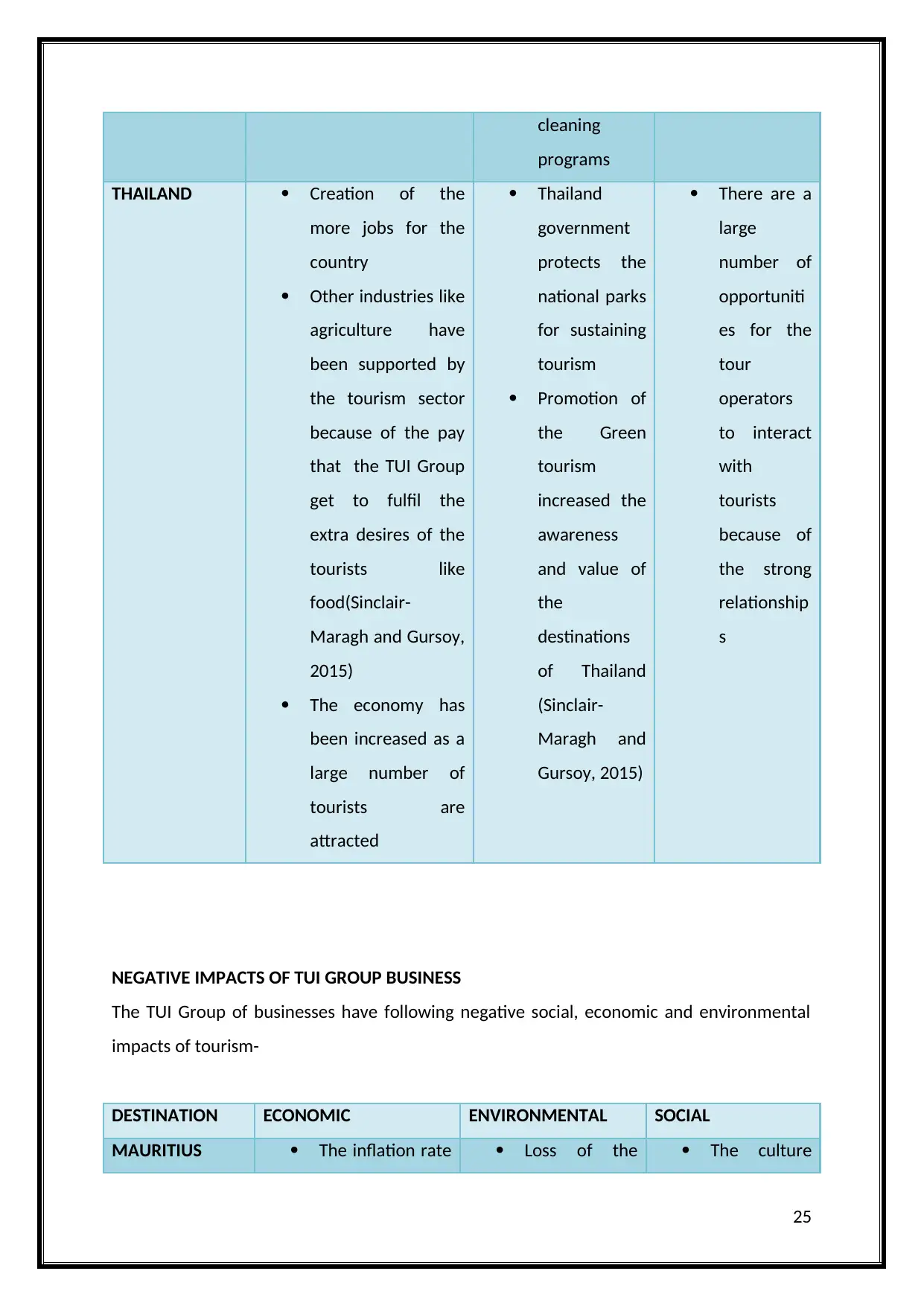
cleaning
programs
THAILAND Creation of the
more jobs for the
country
Other industries like
agriculture have
been supported by
the tourism sector
because of the pay
that the TUI Group
get to fulfil the
extra desires of the
tourists like
food(Sinclair-
Maragh and Gursoy,
2015)
The economy has
been increased as a
large number of
tourists are
attracted
Thailand
government
protects the
national parks
for sustaining
tourism
Promotion of
the Green
tourism
increased the
awareness
and value of
the
destinations
of Thailand
(Sinclair-
Maragh and
Gursoy, 2015)
There are a
large
number of
opportuniti
es for the
tour
operators
to interact
with
tourists
because of
the strong
relationship
s
NEGATIVE IMPACTS OF TUI GROUP BUSINESS
The TUI Group of businesses have following negative social, economic and environmental
impacts of tourism-
DESTINATION ECONOMIC ENVIRONMENTAL SOCIAL
MAURITIUS The inflation rate Loss of the The culture
25
programs
THAILAND Creation of the
more jobs for the
country
Other industries like
agriculture have
been supported by
the tourism sector
because of the pay
that the TUI Group
get to fulfil the
extra desires of the
tourists like
food(Sinclair-
Maragh and Gursoy,
2015)
The economy has
been increased as a
large number of
tourists are
attracted
Thailand
government
protects the
national parks
for sustaining
tourism
Promotion of
the Green
tourism
increased the
awareness
and value of
the
destinations
of Thailand
(Sinclair-
Maragh and
Gursoy, 2015)
There are a
large
number of
opportuniti
es for the
tour
operators
to interact
with
tourists
because of
the strong
relationship
s
NEGATIVE IMPACTS OF TUI GROUP BUSINESS
The TUI Group of businesses have following negative social, economic and environmental
impacts of tourism-
DESTINATION ECONOMIC ENVIRONMENTAL SOCIAL
MAURITIUS The inflation rate Loss of the The culture
25
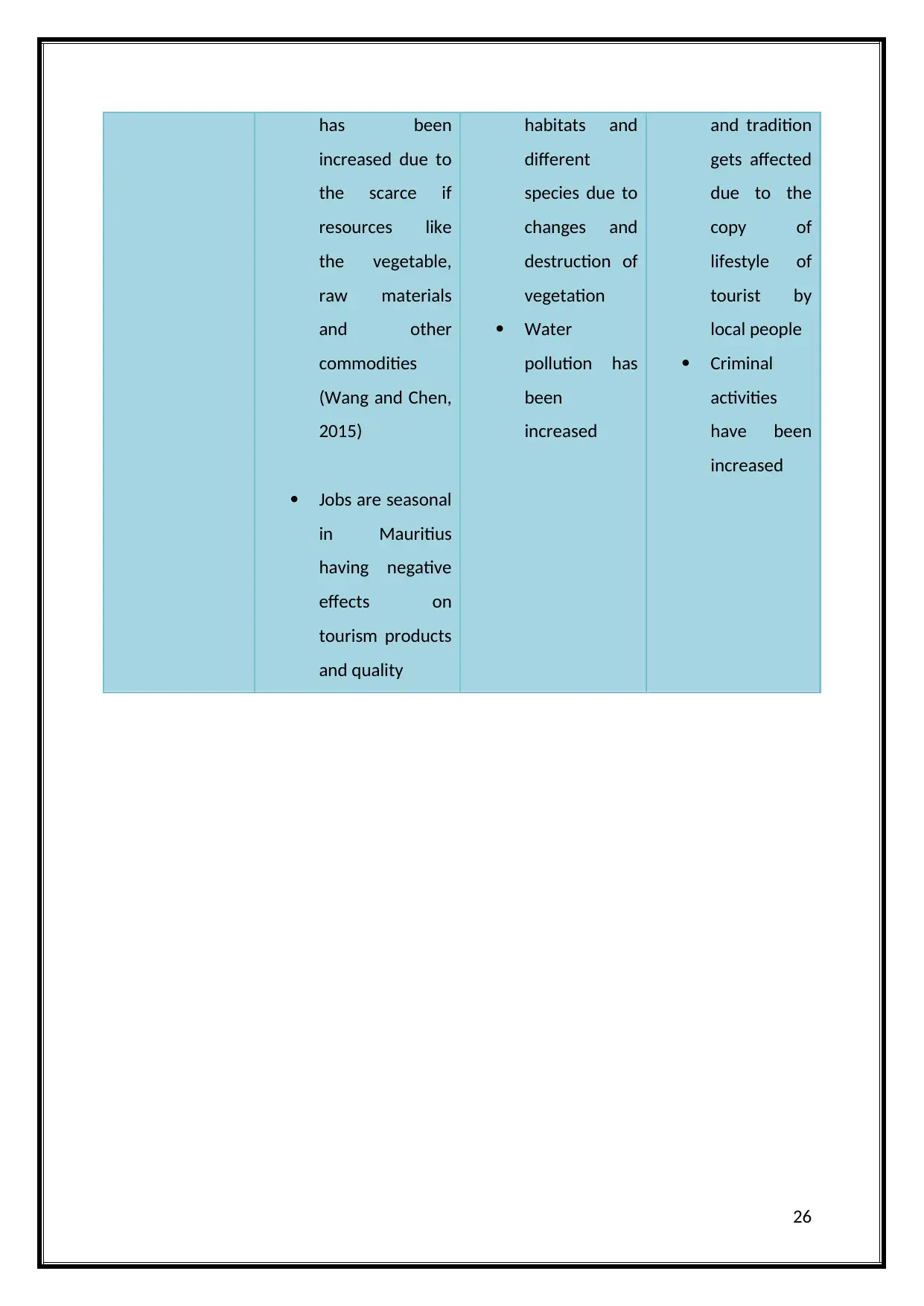
has been
increased due to
the scarce if
resources like
the vegetable,
raw materials
and other
commodities
(Wang and Chen,
2015)
Jobs are seasonal
in Mauritius
having negative
effects on
tourism products
and quality
habitats and
different
species due to
changes and
destruction of
vegetation
Water
pollution has
been
increased
and tradition
gets affected
due to the
copy of
lifestyle of
tourist by
local people
Criminal
activities
have been
increased
26
increased due to
the scarce if
resources like
the vegetable,
raw materials
and other
commodities
(Wang and Chen,
2015)
Jobs are seasonal
in Mauritius
having negative
effects on
tourism products
and quality
habitats and
different
species due to
changes and
destruction of
vegetation
Water
pollution has
been
increased
and tradition
gets affected
due to the
copy of
lifestyle of
tourist by
local people
Criminal
activities
have been
increased
26
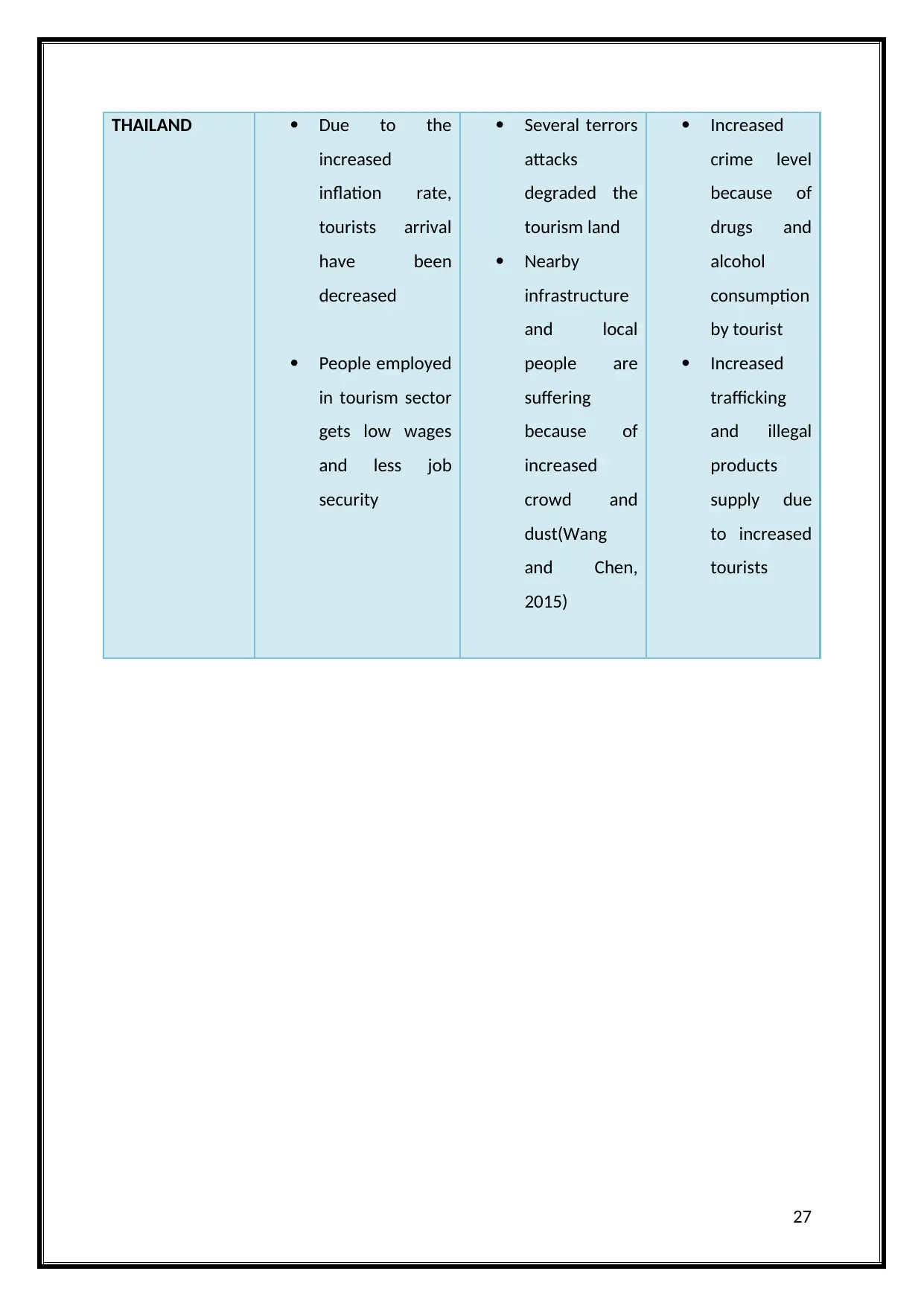
THAILAND Due to the
increased
inflation rate,
tourists arrival
have been
decreased
People employed
in tourism sector
gets low wages
and less job
security
Several terrors
attacks
degraded the
tourism land
Nearby
infrastructure
and local
people are
suffering
because of
increased
crowd and
dust(Wang
and Chen,
2015)
Increased
crime level
because of
drugs and
alcohol
consumption
by tourist
Increased
trafficking
and illegal
products
supply due
to increased
tourists
27
increased
inflation rate,
tourists arrival
have been
decreased
People employed
in tourism sector
gets low wages
and less job
security
Several terrors
attacks
degraded the
tourism land
Nearby
infrastructure
and local
people are
suffering
because of
increased
crowd and
dust(Wang
and Chen,
2015)
Increased
crime level
because of
drugs and
alcohol
consumption
by tourist
Increased
trafficking
and illegal
products
supply due
to increased
tourists
27
Secure Best Marks with AI Grader
Need help grading? Try our AI Grader for instant feedback on your assignments.
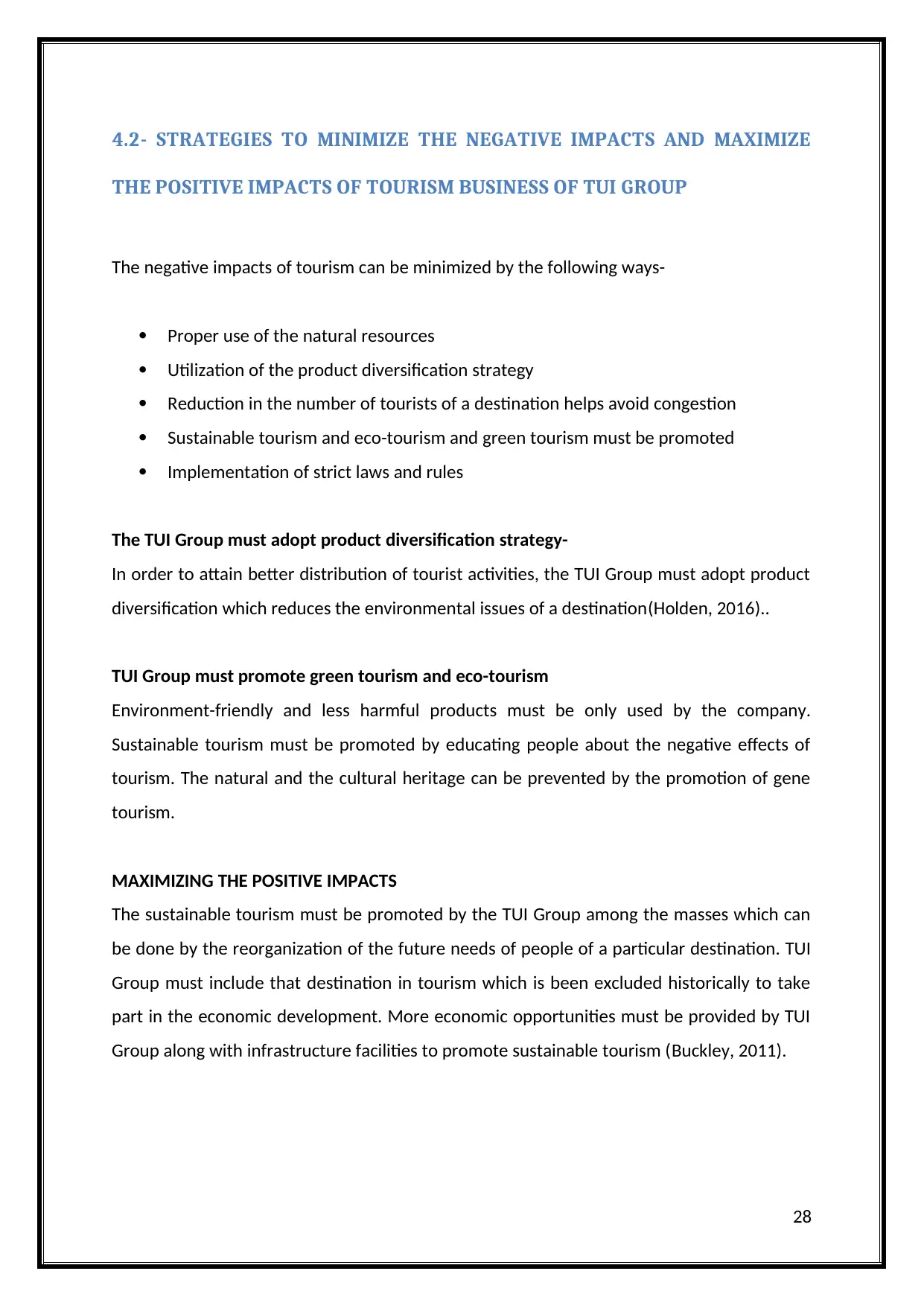
4.2- STRATEGIES TO MINIMIZE THE NEGATIVE IMPACTS AND MAXIMIZE
THE POSITIVE IMPACTS OF TOURISM BUSINESS OF TUI GROUP
The negative impacts of tourism can be minimized by the following ways-
Proper use of the natural resources
Utilization of the product diversification strategy
Reduction in the number of tourists of a destination helps avoid congestion
Sustainable tourism and eco-tourism and green tourism must be promoted
Implementation of strict laws and rules
The TUI Group must adopt product diversification strategy-
In order to attain better distribution of tourist activities, the TUI Group must adopt product
diversification which reduces the environmental issues of a destination(Holden, 2016)..
TUI Group must promote green tourism and eco-tourism
Environment-friendly and less harmful products must be only used by the company.
Sustainable tourism must be promoted by educating people about the negative effects of
tourism. The natural and the cultural heritage can be prevented by the promotion of gene
tourism.
MAXIMIZING THE POSITIVE IMPACTS
The sustainable tourism must be promoted by the TUI Group among the masses which can
be done by the reorganization of the future needs of people of a particular destination. TUI
Group must include that destination in tourism which is been excluded historically to take
part in the economic development. More economic opportunities must be provided by TUI
Group along with infrastructure facilities to promote sustainable tourism (Buckley, 2011).
28
THE POSITIVE IMPACTS OF TOURISM BUSINESS OF TUI GROUP
The negative impacts of tourism can be minimized by the following ways-
Proper use of the natural resources
Utilization of the product diversification strategy
Reduction in the number of tourists of a destination helps avoid congestion
Sustainable tourism and eco-tourism and green tourism must be promoted
Implementation of strict laws and rules
The TUI Group must adopt product diversification strategy-
In order to attain better distribution of tourist activities, the TUI Group must adopt product
diversification which reduces the environmental issues of a destination(Holden, 2016)..
TUI Group must promote green tourism and eco-tourism
Environment-friendly and less harmful products must be only used by the company.
Sustainable tourism must be promoted by educating people about the negative effects of
tourism. The natural and the cultural heritage can be prevented by the promotion of gene
tourism.
MAXIMIZING THE POSITIVE IMPACTS
The sustainable tourism must be promoted by the TUI Group among the masses which can
be done by the reorganization of the future needs of people of a particular destination. TUI
Group must include that destination in tourism which is been excluded historically to take
part in the economic development. More economic opportunities must be provided by TUI
Group along with infrastructure facilities to promote sustainable tourism (Buckley, 2011).
28
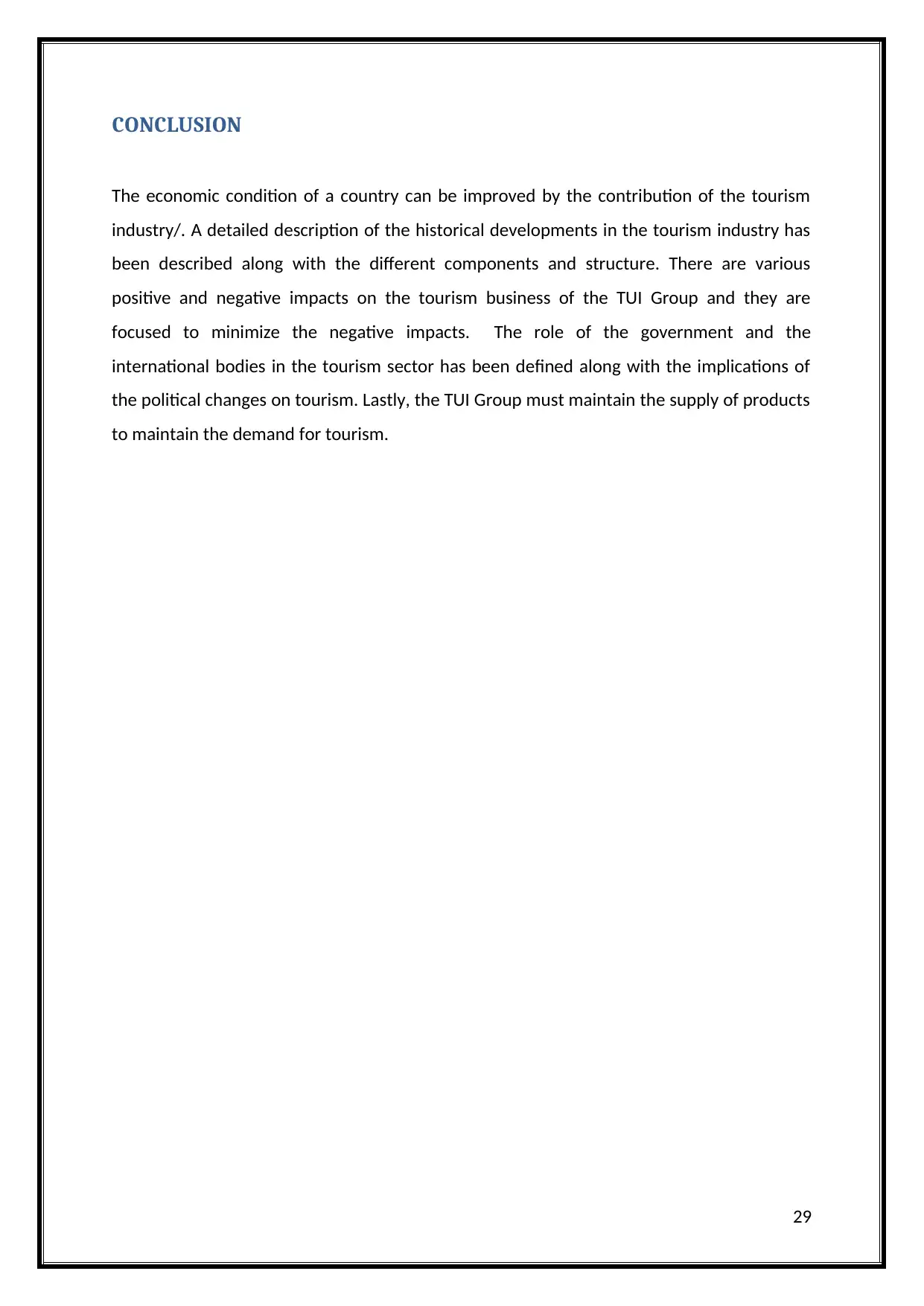
CONCLUSION
The economic condition of a country can be improved by the contribution of the tourism
industry/. A detailed description of the historical developments in the tourism industry has
been described along with the different components and structure. There are various
positive and negative impacts on the tourism business of the TUI Group and they are
focused to minimize the negative impacts. The role of the government and the
international bodies in the tourism sector has been defined along with the implications of
the political changes on tourism. Lastly, the TUI Group must maintain the supply of products
to maintain the demand for tourism.
29
The economic condition of a country can be improved by the contribution of the tourism
industry/. A detailed description of the historical developments in the tourism industry has
been described along with the different components and structure. There are various
positive and negative impacts on the tourism business of the TUI Group and they are
focused to minimize the negative impacts. The role of the government and the
international bodies in the tourism sector has been defined along with the implications of
the political changes on tourism. Lastly, the TUI Group must maintain the supply of products
to maintain the demand for tourism.
29
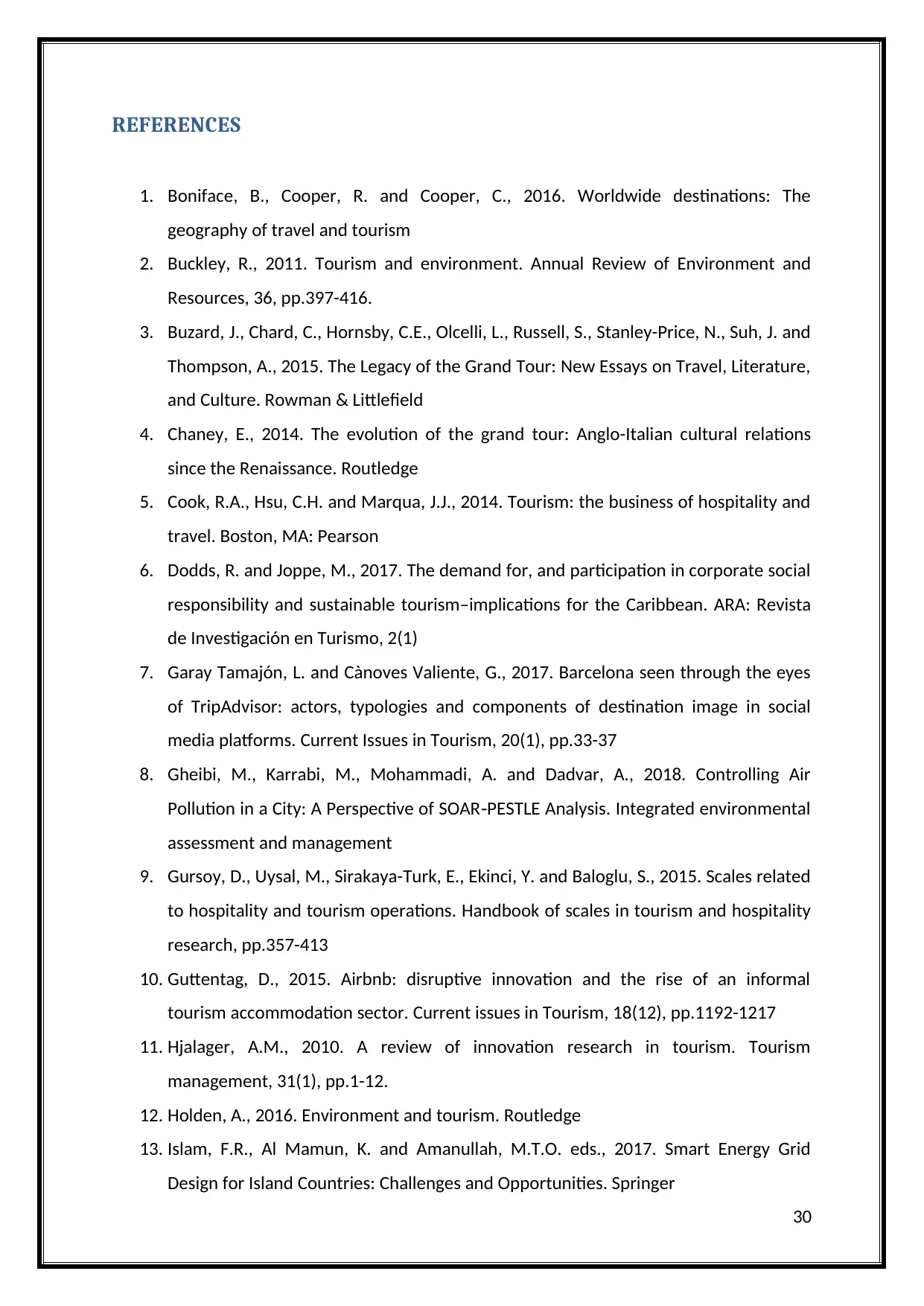
REFERENCES
1. Boniface, B., Cooper, R. and Cooper, C., 2016. Worldwide destinations: The
geography of travel and tourism
2. Buckley, R., 2011. Tourism and environment. Annual Review of Environment and
Resources, 36, pp.397-416.
3. Buzard, J., Chard, C., Hornsby, C.E., Olcelli, L., Russell, S., Stanley-Price, N., Suh, J. and
Thompson, A., 2015. The Legacy of the Grand Tour: New Essays on Travel, Literature,
and Culture. Rowman & Littlefield
4. Chaney, E., 2014. The evolution of the grand tour: Anglo-Italian cultural relations
since the Renaissance. Routledge
5. Cook, R.A., Hsu, C.H. and Marqua, J.J., 2014. Tourism: the business of hospitality and
travel. Boston, MA: Pearson
6. Dodds, R. and Joppe, M., 2017. The demand for, and participation in corporate social
responsibility and sustainable tourism–implications for the Caribbean. ARA: Revista
de Investigación en Turismo, 2(1)
7. Garay Tamajón, L. and Cànoves Valiente, G., 2017. Barcelona seen through the eyes
of TripAdvisor: actors, typologies and components of destination image in social
media platforms. Current Issues in Tourism, 20(1), pp.33-37
8. Gheibi, M., Karrabi, M., Mohammadi, A. and Dadvar, A., 2018. Controlling Air
Pollution in a City: A Perspective of SOAR PESTLE Analysis. Integrated environmental‐
assessment and management
9. Gursoy, D., Uysal, M., Sirakaya-Turk, E., Ekinci, Y. and Baloglu, S., 2015. Scales related
to hospitality and tourism operations. Handbook of scales in tourism and hospitality
research, pp.357-413
10. Guttentag, D., 2015. Airbnb: disruptive innovation and the rise of an informal
tourism accommodation sector. Current issues in Tourism, 18(12), pp.1192-1217
11. Hjalager, A.M., 2010. A review of innovation research in tourism. Tourism
management, 31(1), pp.1-12.
12. Holden, A., 2016. Environment and tourism. Routledge
13. Islam, F.R., Al Mamun, K. and Amanullah, M.T.O. eds., 2017. Smart Energy Grid
Design for Island Countries: Challenges and Opportunities. Springer
30
1. Boniface, B., Cooper, R. and Cooper, C., 2016. Worldwide destinations: The
geography of travel and tourism
2. Buckley, R., 2011. Tourism and environment. Annual Review of Environment and
Resources, 36, pp.397-416.
3. Buzard, J., Chard, C., Hornsby, C.E., Olcelli, L., Russell, S., Stanley-Price, N., Suh, J. and
Thompson, A., 2015. The Legacy of the Grand Tour: New Essays on Travel, Literature,
and Culture. Rowman & Littlefield
4. Chaney, E., 2014. The evolution of the grand tour: Anglo-Italian cultural relations
since the Renaissance. Routledge
5. Cook, R.A., Hsu, C.H. and Marqua, J.J., 2014. Tourism: the business of hospitality and
travel. Boston, MA: Pearson
6. Dodds, R. and Joppe, M., 2017. The demand for, and participation in corporate social
responsibility and sustainable tourism–implications for the Caribbean. ARA: Revista
de Investigación en Turismo, 2(1)
7. Garay Tamajón, L. and Cànoves Valiente, G., 2017. Barcelona seen through the eyes
of TripAdvisor: actors, typologies and components of destination image in social
media platforms. Current Issues in Tourism, 20(1), pp.33-37
8. Gheibi, M., Karrabi, M., Mohammadi, A. and Dadvar, A., 2018. Controlling Air
Pollution in a City: A Perspective of SOAR PESTLE Analysis. Integrated environmental‐
assessment and management
9. Gursoy, D., Uysal, M., Sirakaya-Turk, E., Ekinci, Y. and Baloglu, S., 2015. Scales related
to hospitality and tourism operations. Handbook of scales in tourism and hospitality
research, pp.357-413
10. Guttentag, D., 2015. Airbnb: disruptive innovation and the rise of an informal
tourism accommodation sector. Current issues in Tourism, 18(12), pp.1192-1217
11. Hjalager, A.M., 2010. A review of innovation research in tourism. Tourism
management, 31(1), pp.1-12.
12. Holden, A., 2016. Environment and tourism. Routledge
13. Islam, F.R., Al Mamun, K. and Amanullah, M.T.O. eds., 2017. Smart Energy Grid
Design for Island Countries: Challenges and Opportunities. Springer
30
Paraphrase This Document
Need a fresh take? Get an instant paraphrase of this document with our AI Paraphraser
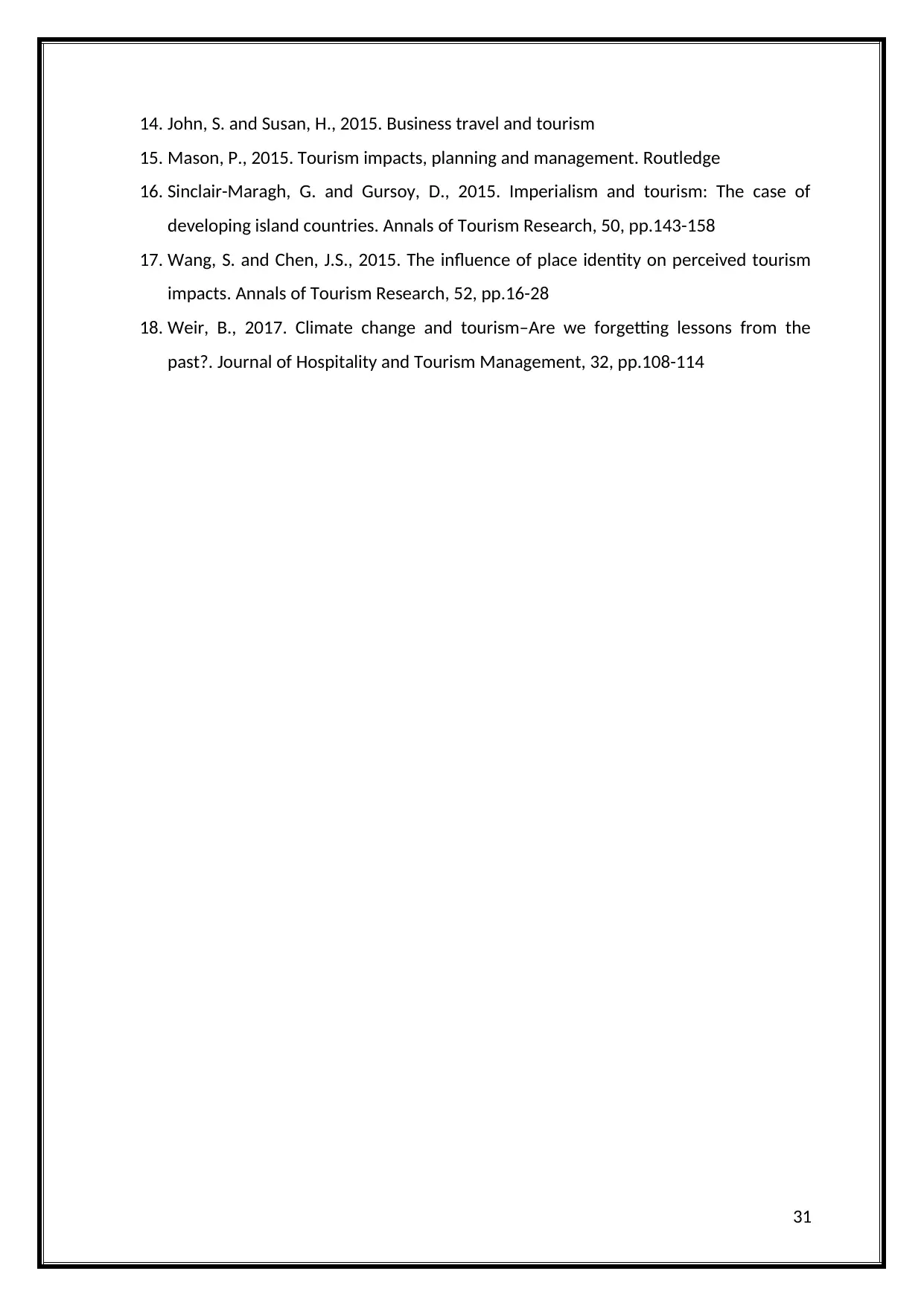
14. John, S. and Susan, H., 2015. Business travel and tourism
15. Mason, P., 2015. Tourism impacts, planning and management. Routledge
16. Sinclair-Maragh, G. and Gursoy, D., 2015. Imperialism and tourism: The case of
developing island countries. Annals of Tourism Research, 50, pp.143-158
17. Wang, S. and Chen, J.S., 2015. The influence of place identity on perceived tourism
impacts. Annals of Tourism Research, 52, pp.16-28
18. Weir, B., 2017. Climate change and tourism–Are we forgetting lessons from the
past?. Journal of Hospitality and Tourism Management, 32, pp.108-114
31
15. Mason, P., 2015. Tourism impacts, planning and management. Routledge
16. Sinclair-Maragh, G. and Gursoy, D., 2015. Imperialism and tourism: The case of
developing island countries. Annals of Tourism Research, 50, pp.143-158
17. Wang, S. and Chen, J.S., 2015. The influence of place identity on perceived tourism
impacts. Annals of Tourism Research, 52, pp.16-28
18. Weir, B., 2017. Climate change and tourism–Are we forgetting lessons from the
past?. Journal of Hospitality and Tourism Management, 32, pp.108-114
31
1 out of 32
Related Documents
Your All-in-One AI-Powered Toolkit for Academic Success.
+13062052269
info@desklib.com
Available 24*7 on WhatsApp / Email
![[object Object]](/_next/static/media/star-bottom.7253800d.svg)
Unlock your academic potential
© 2024 | Zucol Services PVT LTD | All rights reserved.





